Reintegration of Ukrainians: Cultural-Identity And Socio-Economic Aspects Of Return
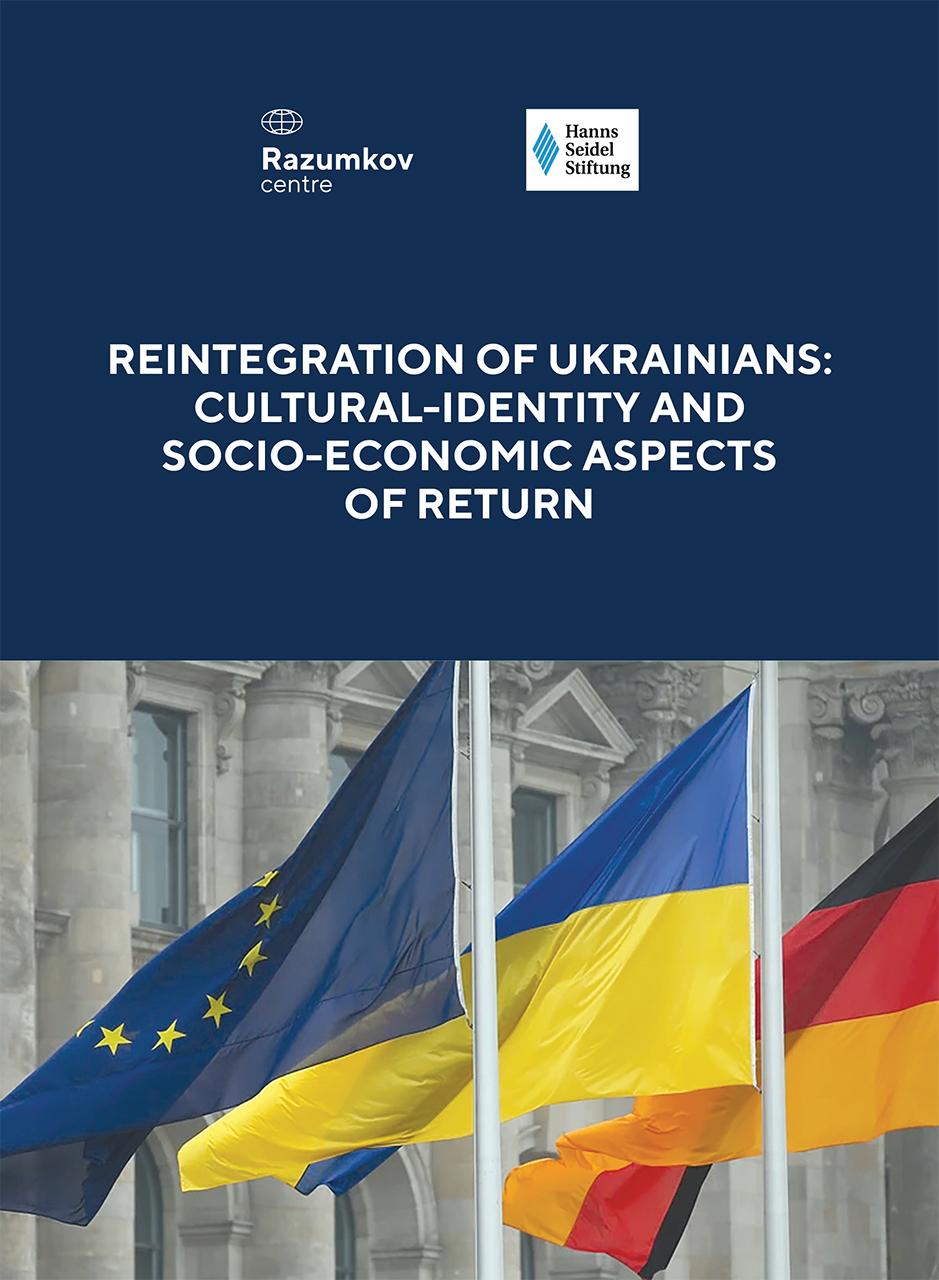
Editor-in-chief — Yuriy YAKYMENKO,
Project manager — Olga PYSHCHULINA
Authors of the report — Olga PYSHCHULINA, Yuriy YAKIMENKO, Tetiana MARTSINKOVSKA
The Razumkov Center expresses its sincere gratitude to Oleksandra KOLOMIETS, Mykola SUDAKOV, and Iryna NOVAK for their advice, comments, and analytical and statistical materials used in the preparation of this analytical report.
The analytical report aims to provide a comprehensive assessment of the conditions, barriers, and potential for the return of Ukrainians, as well as to develop recommendations for the state, local self-government, international partners, and civil society. Particular attention is paid to the interconnection between cultural-identity and socio-economic factors, as the balance between them will determine the success of future reintegration and Ukraine’s ability to leverage the experience gained for post-war recovery and development.
Securitisation of State Policy and Society in Ukraine
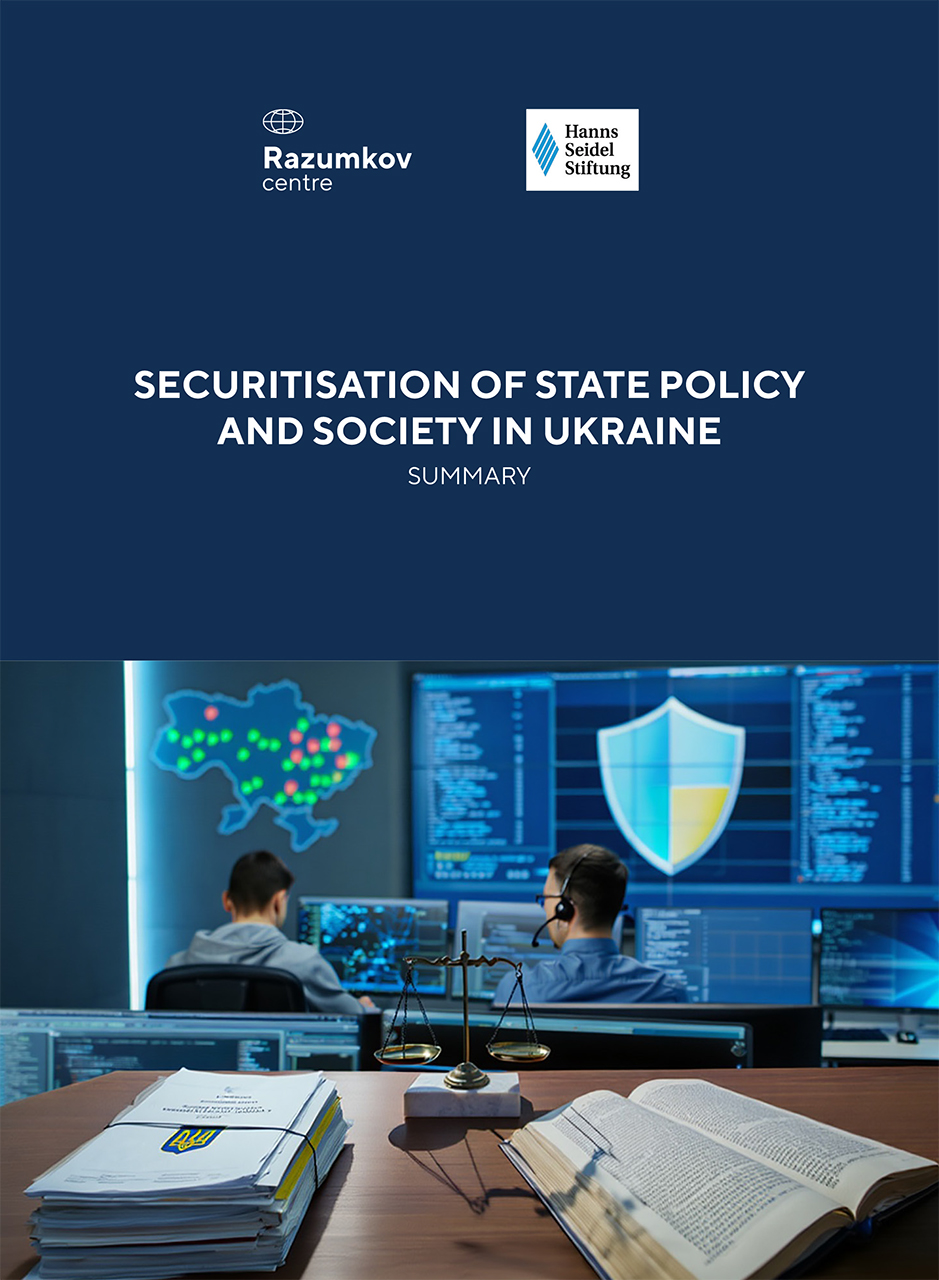
The Policy Paper was developed by the Razumkov Centre based on the results of the research project «The Concept of Securitisation of State Policy and Society and Prospects for its Implementation in Ukraine», supported by the Hanns Seidel Stiftung in Ukraine. The project is a follow-up to the 2024 study «Best foreign practices and Ukraine’s experience in implementing state-public partnerships in civil defence», which was the first to identify the need to securitise state policy and society in Ukraine.
Ukraine’s Foreign Policy In the Context Of Geopolitical Processes
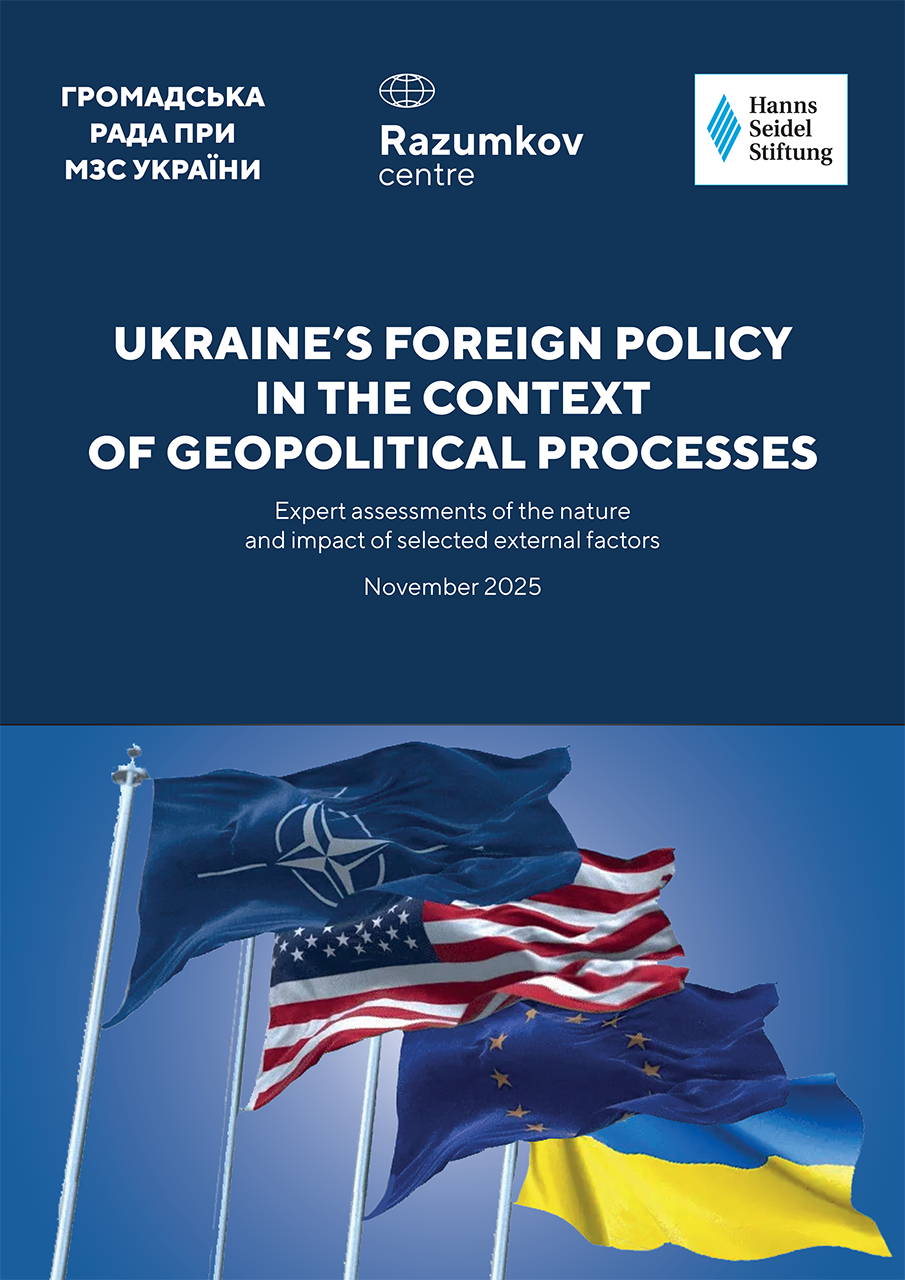
This study was prepared by members of the Public Council under the Ministry of Foreign Affairs of Ukraine (MFA) with the participation of the Razumkov Centre, the Open Politics Foundation, and the NATO-Ukraine Civic League as part of a project supported by Hanns Seidel Foundation.
The project included a series of research initiatives and public presentations of expert surveys focused on the challenges and specifics of Ukrainian diplomacy under wartime conditions, external influences, and prospects for European integration.
The current study focuses on specific external processes and trends affecting Ukraine’s position on the international stage and its relations with partner states. Important in this context are developments within the EU, the American factor, and the partnership with NATO.
Ukraine’s Foreign Policy: Features, Challenges, Priorities
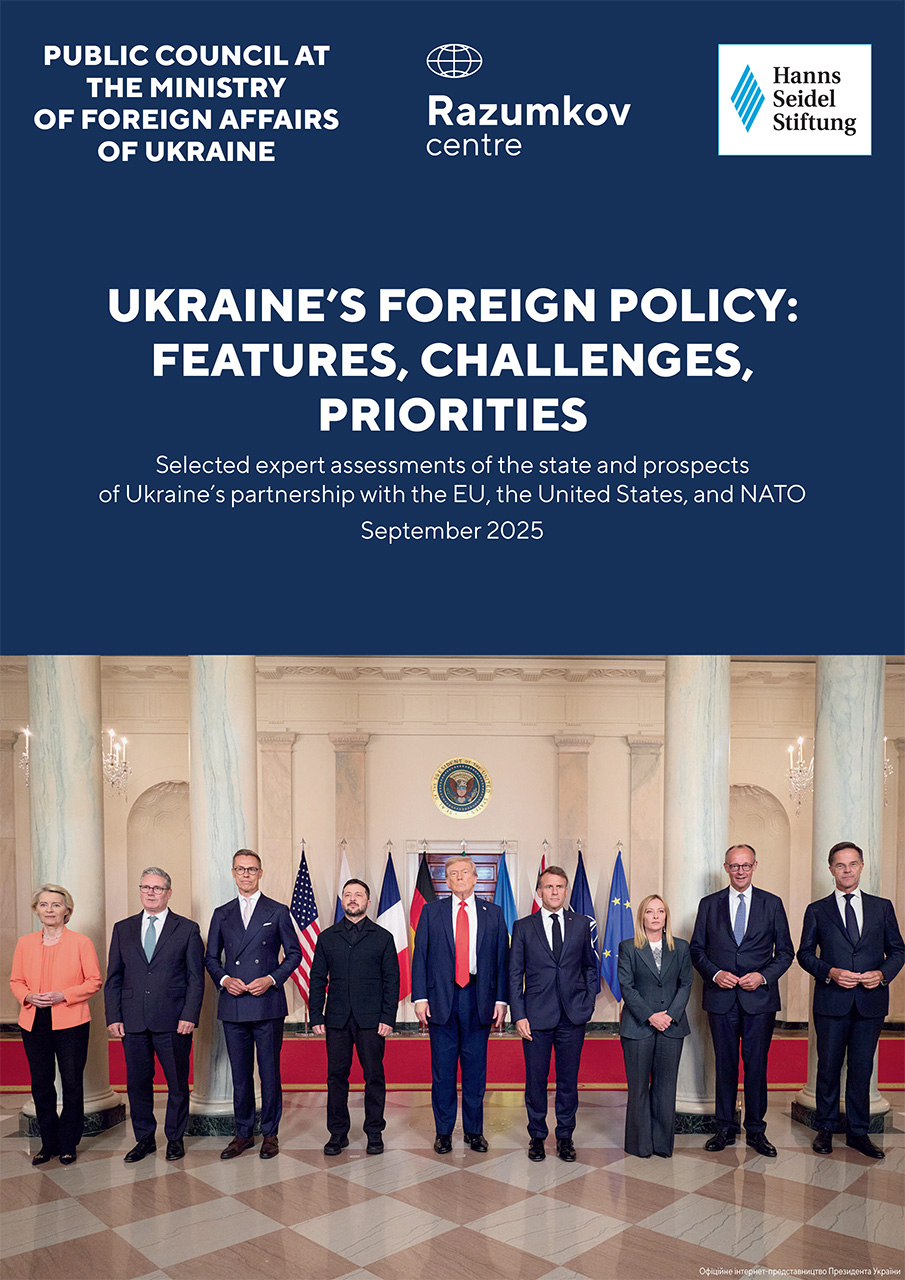
This expert study on the specific features and key directions of Ukraine’s foreign policy was prepared by members of the Public Council under the Ministry of Foreign Affairs of Ukraine (MFA) with the participation of the Razumkov Centre, the Open Politics Foundation and the NATOUkraine Civic League, supported by Hanns Seidel Foundation.1 The study generally focuses on trends and priorities in Ukraine’s European integration, the specifics of the US-Ukraine partnership, as well as the state and prospects of Ukraine’s Euro-Atlantic integration.2 It follows on from a previous joint project on Ukraine’s foreign policy issues.
Ukraine’s European Integration: Current State, Challenges, Prospects
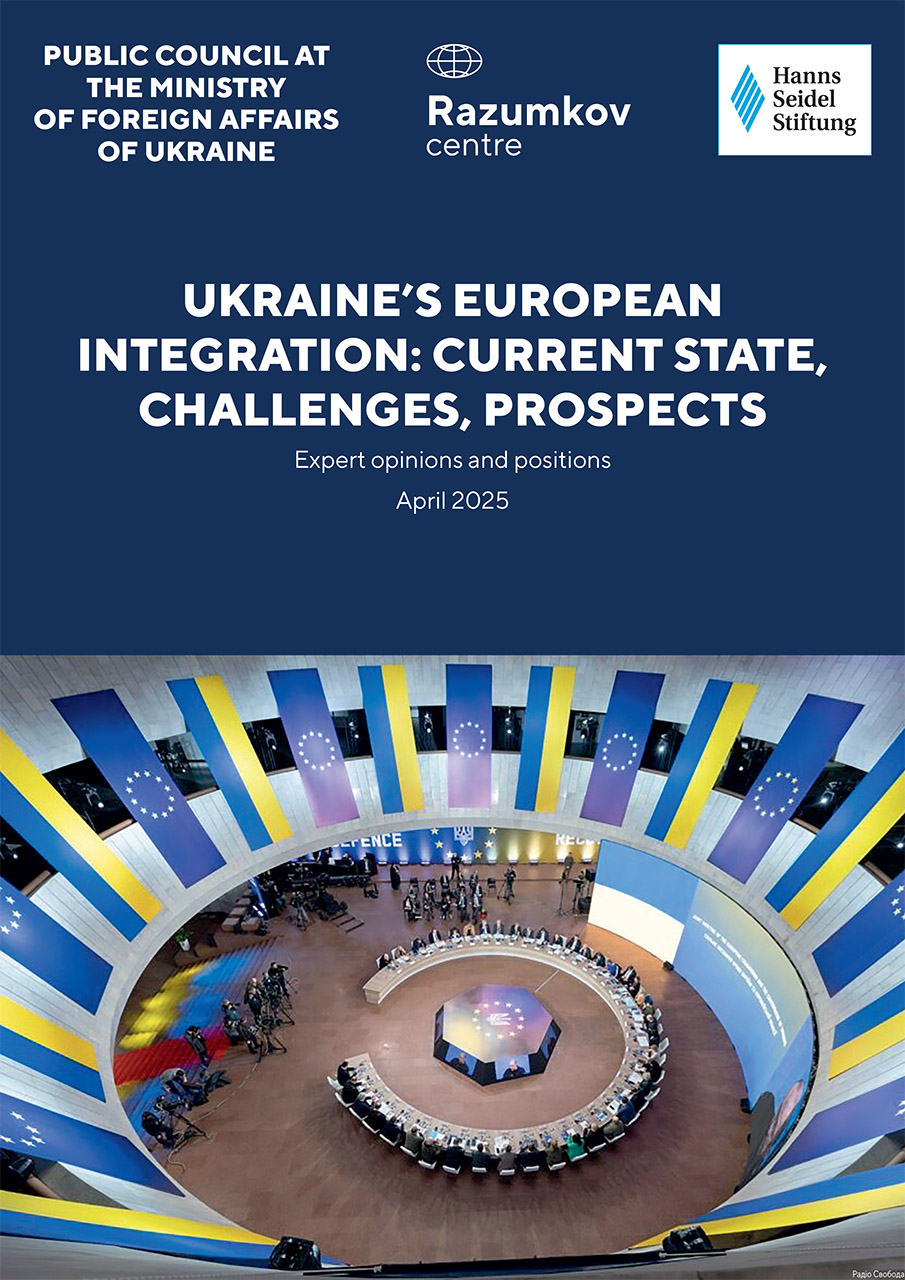
The expert survey conducted in April 2025 by the Razumkov Centre and the Public Council at the Ministry of Foreign Affairs of Ukraine with the support of the Hanns Seidel Stiftung focuses on the trends, features and priorities of Ukraine’s European integration in the face of large-scale russian aggression.1 This study is a follow-up to the previous joint project on Ukraine’s foreign policy.2
The European track in Kyiv’s foreign policy is currently taking a priority, strategically important role for many reasons. In particular, with Donald Trump’s coming to power, US foreign policy, including towards Ukraine, has changed dramatically. Today, the United States’ political and diplomatic solidarity and support for Ukraine, as well as its military and financial assistance, are in jeopardy. In such settings, Europe is de facto becoming Ukraine’s key ally in countering russian intervention. At the same time, Kyiv has reached the final stretch of European integration, with the opening of negotiations on Ukraine’s EU accession in the first half of 2025 during Poland’s EU presidency.
As part of this survey, members of the expert community assessed the Ukrainian government’s European integration policy, outlined the problems on the way to the EU, and described the assistance of European countries in confronting the aggressor. In this regard, expert opinions on the effectiveness of the negotiation process to end the war in Ukraine deserve special attention. Also quite interesting are the expert opinions and foresights on the future prospects of Ukraine joining the European community.
The results of the expert survey give grounds for the following generalisations and conclusions.
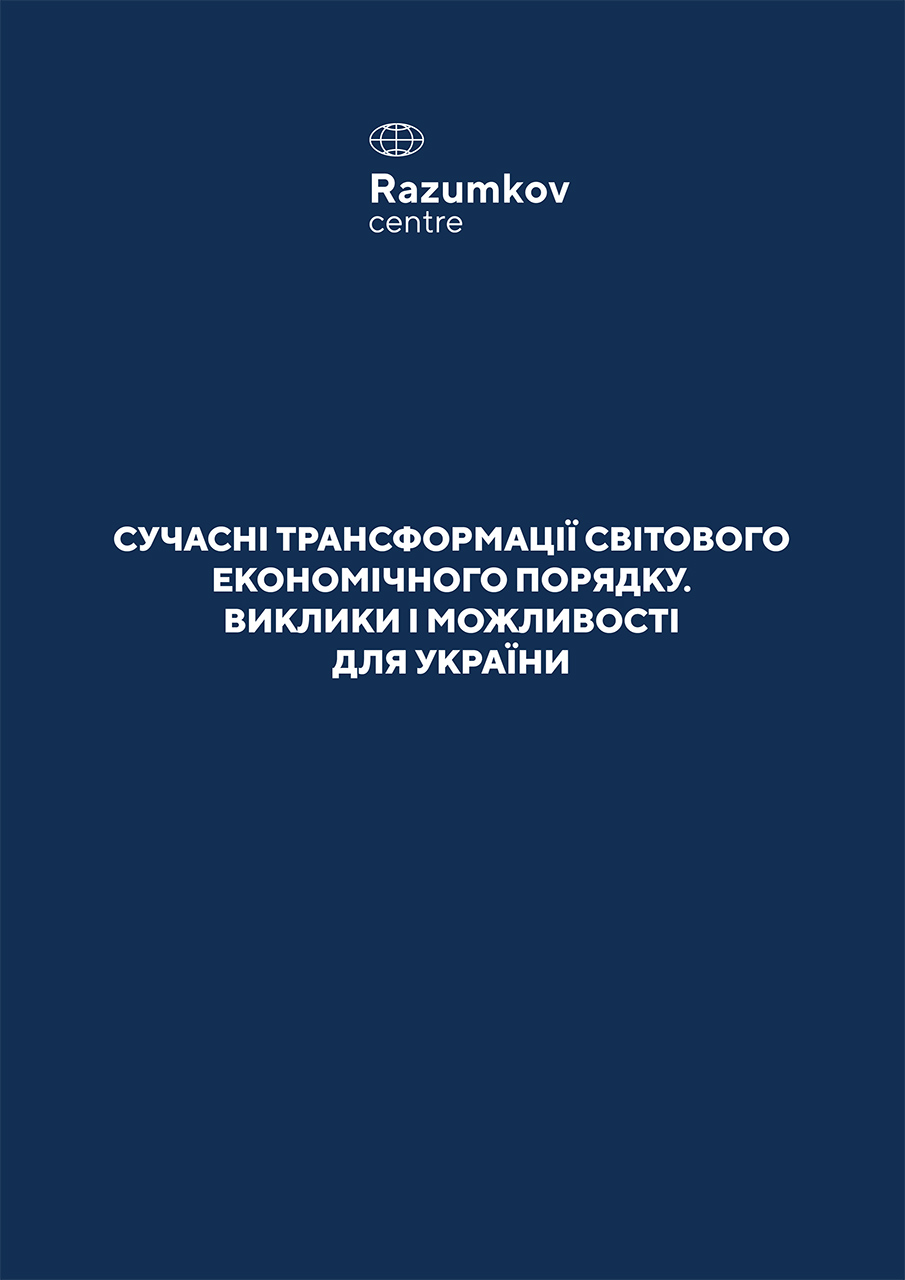
The publication is dedicated to the analysis of modern transformation processes and related risks and challenges in the context of growing geopolitical and geoeconomic uncertainties and contradictions, as well as the tasks and directions of the economic policy of Ukraine in such processes.
Ukrainian Diplomacy’s Peculiarities and Priorities In Times of War
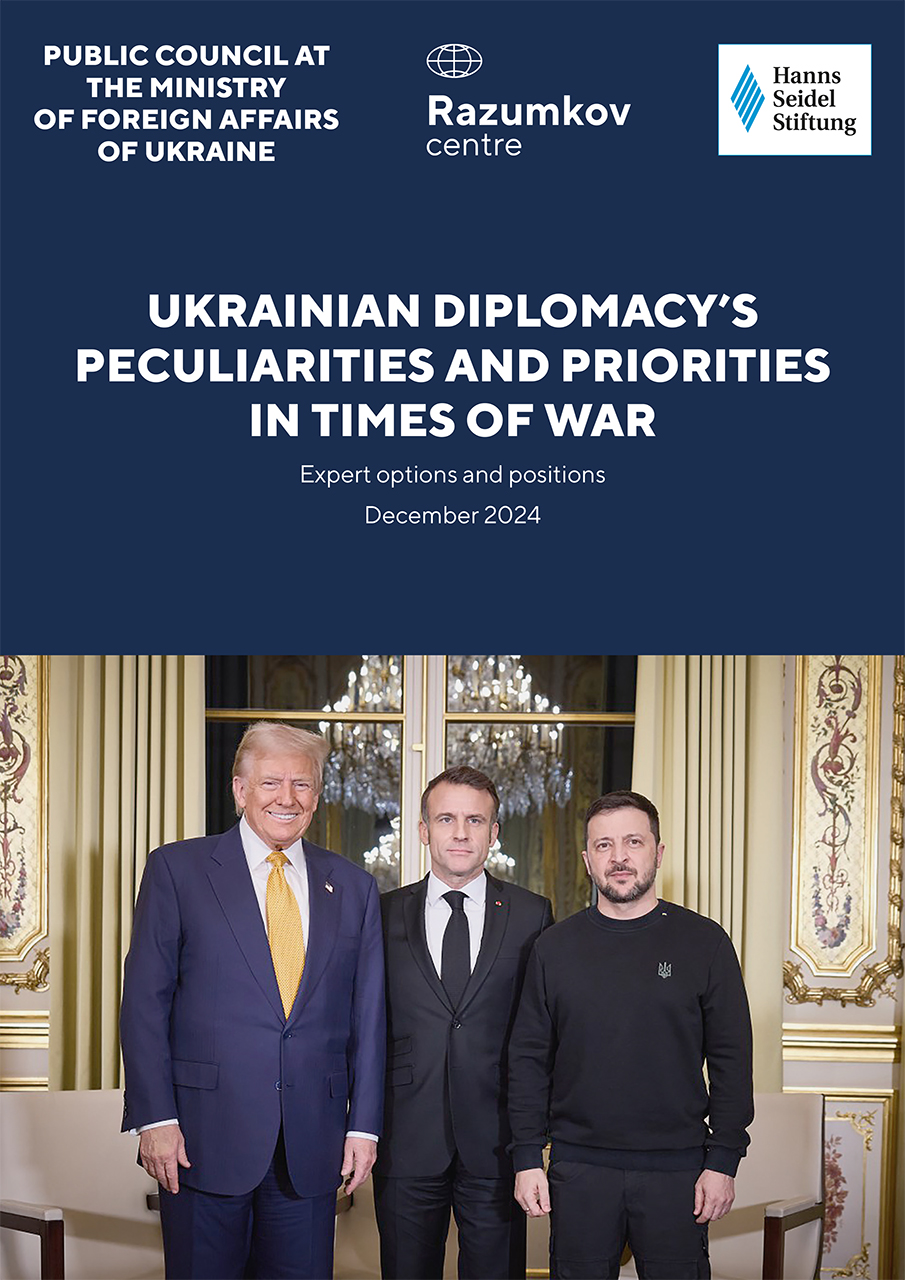
In October and November 2024, the Razumkov Centre and the Public Council at the Ministry of Foreign Affairs of Ukraine, with the support of the Hanns Seidel Stiftung, conducted two expert surveys on Ukraine’s foreign policy.1 These studies focused on the accomplishments and challenges of national diplomacy in 2024, as well as the priorities and tasks on the country’s foreign policy.
During the surveys, experts assessed the nature and impact of global trends, the effectiveness of foreign aid, and the efficiency of Ukraine promoting its interests and initiatives internationally. Additionally, respondents assessed the significance of certain foreign policy events for Ukraine, identified the specifics of Ukraine’s foreign policy in times of war, and the factors affecting government activities on the global stage. Quite interesting are the expert opinions on the state and problems of Ukraine’s European and Euro-Atlantic integration.
Overview of Energy Sector Performance in August 2024
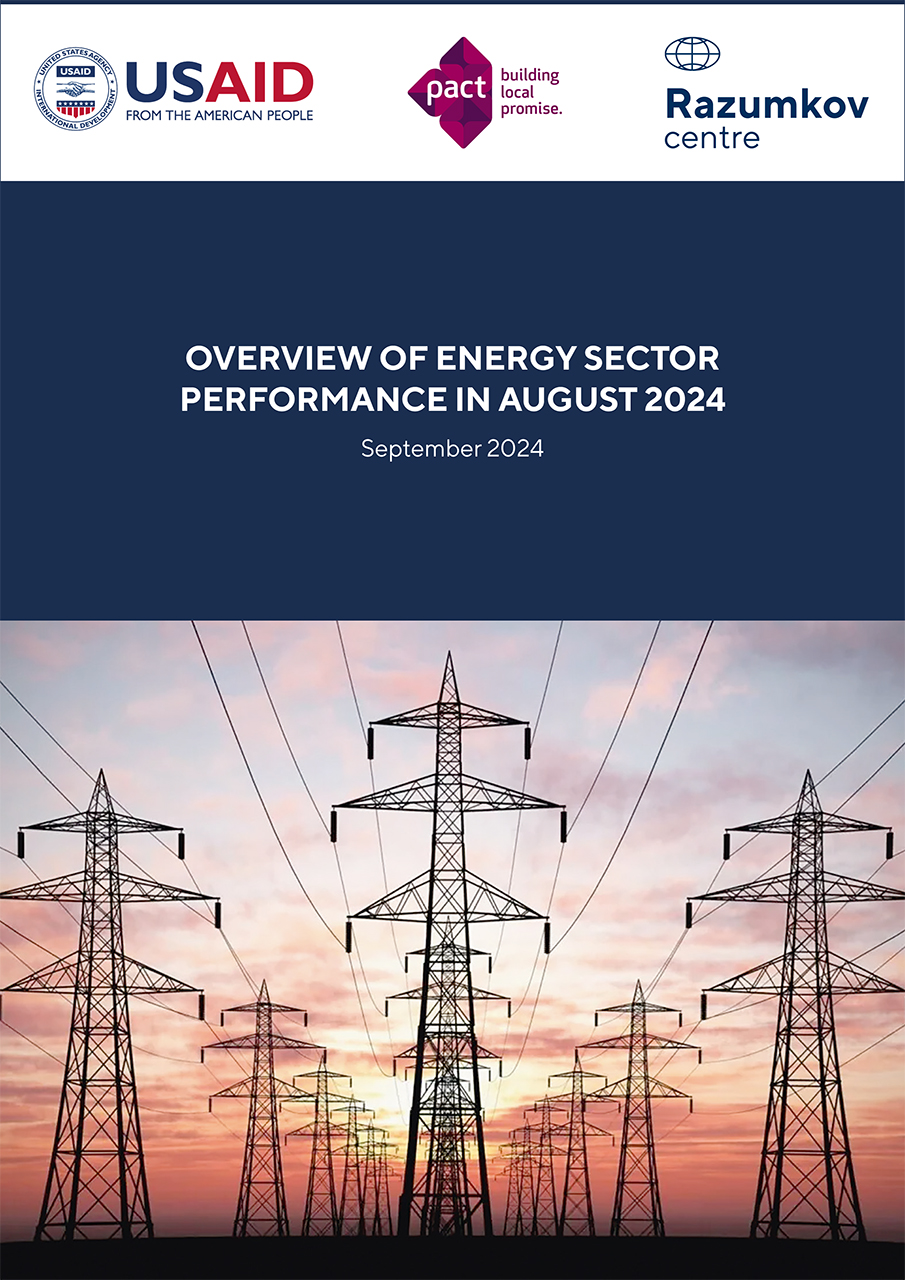
On the night of August 26, following the most massive coordinated strike on the Ukrainian energy system since the beginning of the war, primarily aimed at nuclear power plant infra-structure, units No. 1, 3, and 4 of the Rivne NPP were shut down, while the capacity of the South Ukraine NPP was forcibly reduced. In the evening of the same day, due to a disruption of standard system functions, unit No. 3 of the South Ukraine NPP was shut down. The transition to an off-design reactor control mode, which could potentially cause a level 3 incident, was prevented due to the highly professional training of operators and the symptom-based emergency response system introduced in Ukraine.
Ukraine’s Foreign Policy: Achievements, Challenges, Priorities
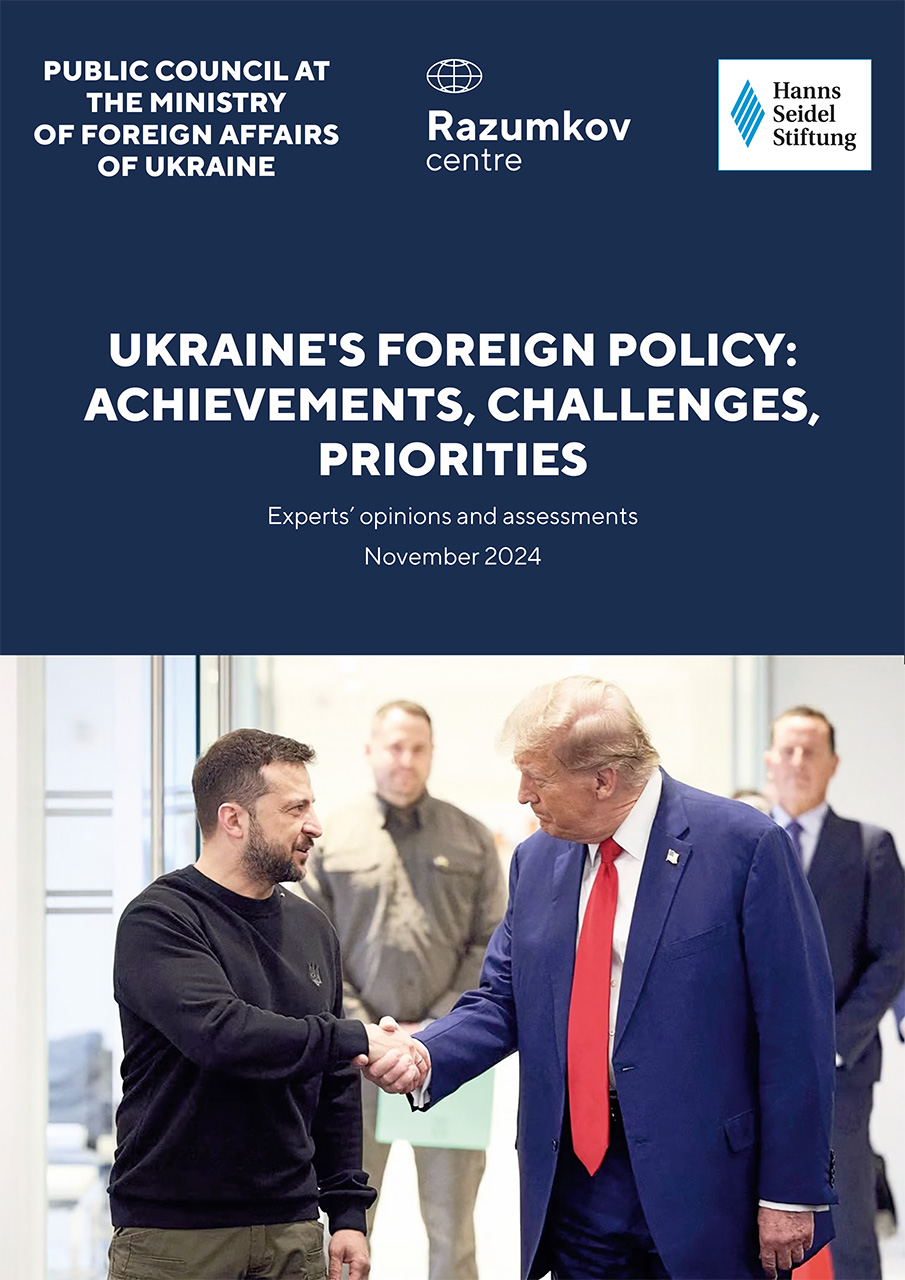
Outlining the events and trends of 2024, Ukraine’s foreign policy can be credited with a series of successful events, active promotion of national interests on global platforms, and closer cooperation with partner countries across the world. Meanwhile, it should be borne in mind that national diplomacy has to act amidst large-scale russian invasion, focusing on the accumulation of external military, financial and economic assistance to ensure resistance to the aggressor. All these effor ts are facing many challenges and threats, unfavourable trends and phenomena of a regional and global nature. So, what are the peculiarities, trends and problems of Kyiv’s foreign policy?
Ukraine’s Energy Sector In September 2024
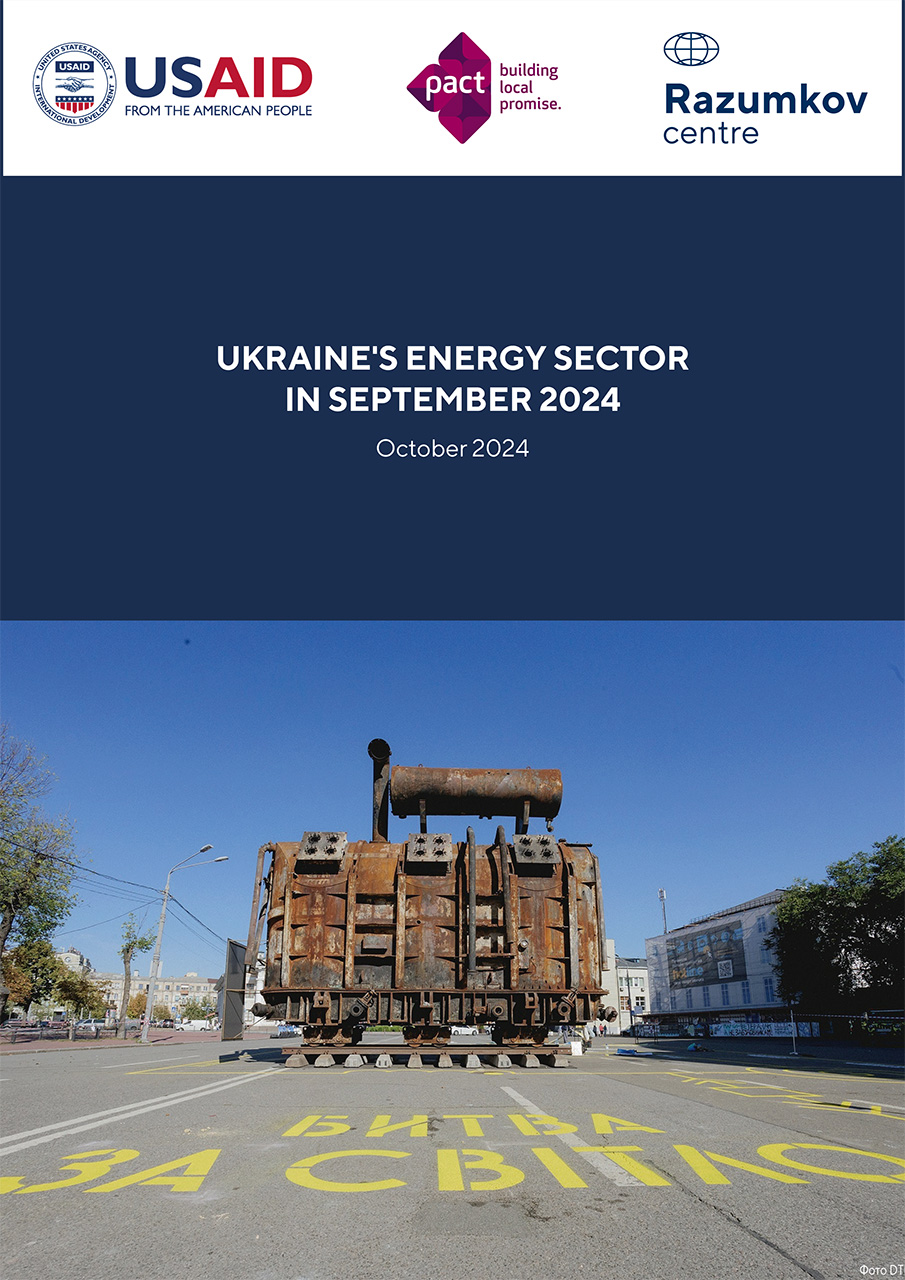
The September bulletin of the UN Human Rights Monitoring Mission in Ukraine states that between 22 March and 31 August 2024, russians launched nine waves of long-range and large-scale coordinated attacks on Ukraine’s electric power system, «damaging or destroying numerous power generation, transmission, and distribution facilities. The strikes had reverberating effects causing harm to the civilian population and the country’s electricity supply, water distribution, sewage and sanitation systems, heating and hot water, public health, education, and the economy». Considering the number of regions affected, the coordinated nature of the attacks, the high precision of the weapons involved, and the sheer scale of harm inflicted on civilians and interconnected civilian systems supplying the population with services essential to their health and survival, the UN Monitoring Mission in Ukraine has reasonable grounds to believe that «multiple aspects of the military campaign… have violated foundational principles of international humanitarian law». This law relies on three main principles for the protection of civilians and civilian objects: distinction, pro-portionality, and precaution. «The Russian armed forces’ attack on electricity infrastructure in Ukraine likely violated all three principles».
Ukraine’s Energy Sector In June 2024
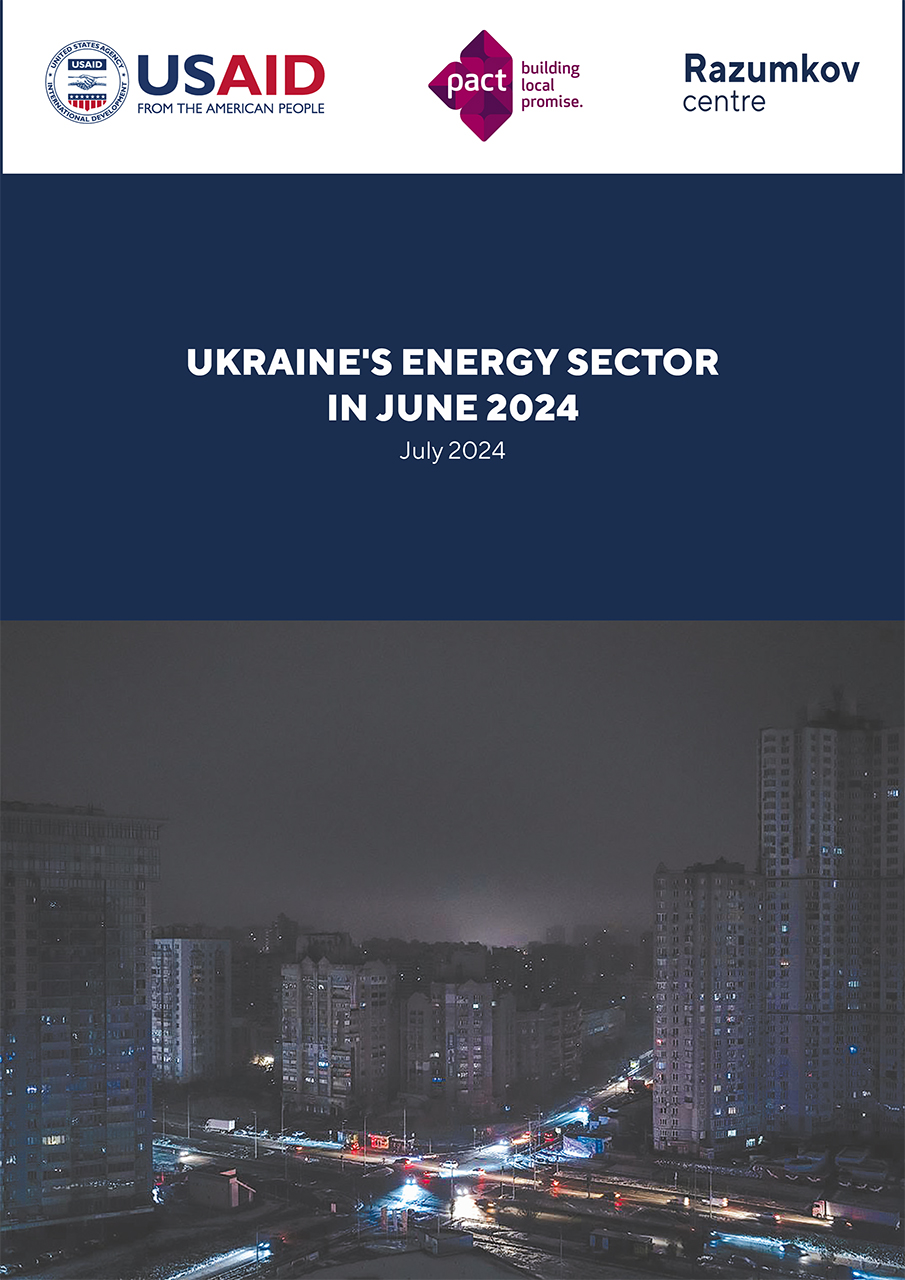
The first day of June saw another massive attack on Ukraine’s critical infrastructure. On 20 and 22 June, some energy facilities were damaged in four regions. As a result, the total losses to Ukraine’s Integrated Power System (IPS) exceeded 9 GW. 90% of TPPs and 40% of HPPs were out of action. As a result, only two days in June were without any power restrictions. Schedules of emergency and/or stabilisation shutdowns were in effect for 44% of hours the month. The capacity of interconnectors was used close to the maximum (1.6-1.7 GW) ten times.
Due to the serious damage to all major power plants, power engineers are unable to use the fuel reserved for the summer consumption peaks. As a result, coal stocks at TPPs and CHPPs increased to 2.6 Mt (+0.4 Mt compared to the last day of May), and gas stocks in underground storage facilities to 5.2 bcm (excluding 4.7 bcm of long-term storage and 0.5 bcm owned by non-residents).
Ukraine’s Convergence With The EU — From Current Lag To Prospective Acceleration
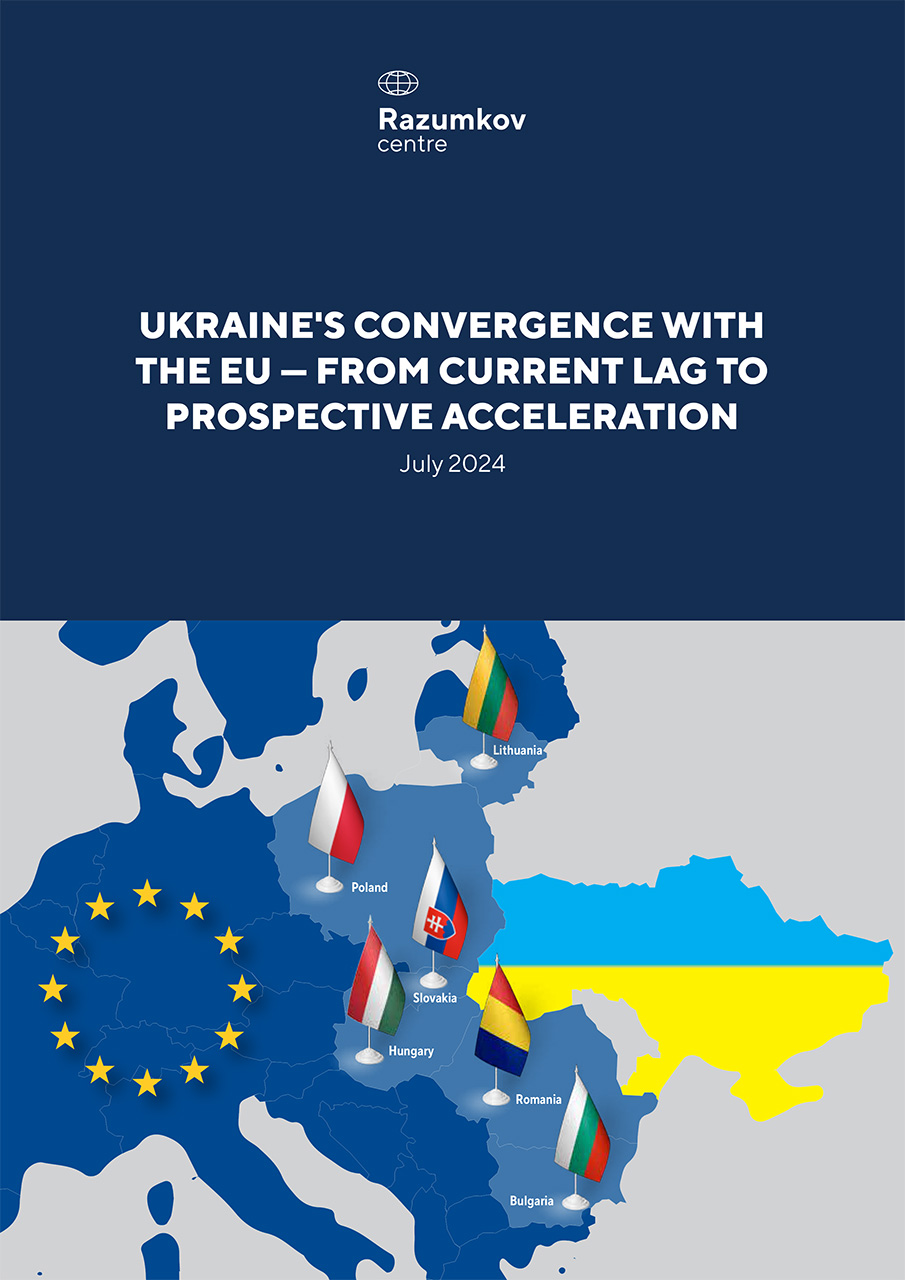
instrumental in convergence (rapprochement) and prosperity for the citizens and countries of the European Union. Therefore, the European Parliament’s decision to start negotiations with Moldova and Ukraine on their future EU membership not only signifies a new level of bilateral and multilateral relations between Ukraine with the EU and its individual members, but also prompts new factors and incentives to directly accelerate socio-economic transformations in the country.
Ukraine’s European integration path, which seemed to be an unattainable horizon just a few years ago, is increasingly gaining ideological, institutional and practical content. Despite not meeting all the criteria for EU membership, Ukraine — and the EU itself — are putting more effort into overcoming numerous internal and external obstacles on the chosen path to full membership. It should be stressed that an unconditional focus on unleashing economic initiative and ensuring social and political freedoms1 has been the peculiarity of post-socialist countries’ the European integration path, and it should be so for Ukraine.
The start of the EU membership talks serves as a strong incentive for Ukraine to accelerate transformation processes, as it was in the late 1990s and early 2000s for the post-socialist countries of Central and Eastern Europe (CEE). Therefore, establishing how Ukraine’s European integration path compares with paths taken by its closest post-socialist partners is important. As it was repeatedly pointed out, this comparison has nothing to do with the intention to «repeat» the neighbours’ positive experience. Quite the contrary, it is to critically assess this experience in order to reduce the likelihood of mistakes, losses and pitfalls that other countries have already gone through or avoided.
Geopolitical Challenges And Geo-Economic Shifts
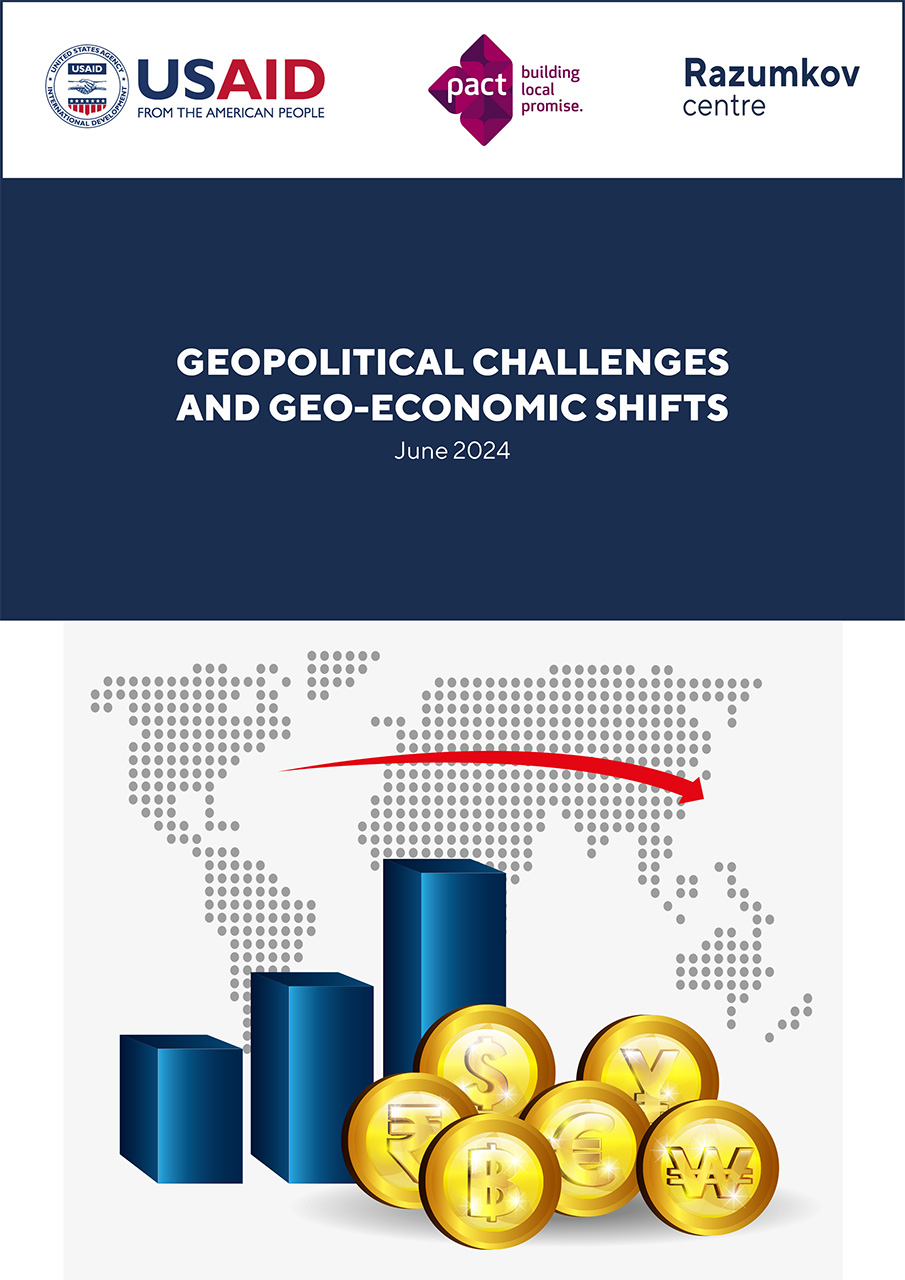
The year 2024 will probably go down in history as a time of rapid change in the global political and economic landscape.1 This process obviously has been underway for a number of years, but so far it has rather tested major world powers for their readiness for fundamental shifts.2 Since the early 2020s, it has become apparent that the world is moving away from a rules-based multilateral order and towards power politics, generating unprecedented risks and challenges that the world has not seen since WWII.
Instead, there are accelerating global transformations resulting in rather controversial and often undesirable changes; meanwhile, challenges are turning into risks that could seriously impede the civilised development of humanity.3
And this may be particularly true of European society, including the Ukrainian one, as it already has every right to be considered an integral part of this community.
International Support to Ukraine for Provision of the Global Food Security
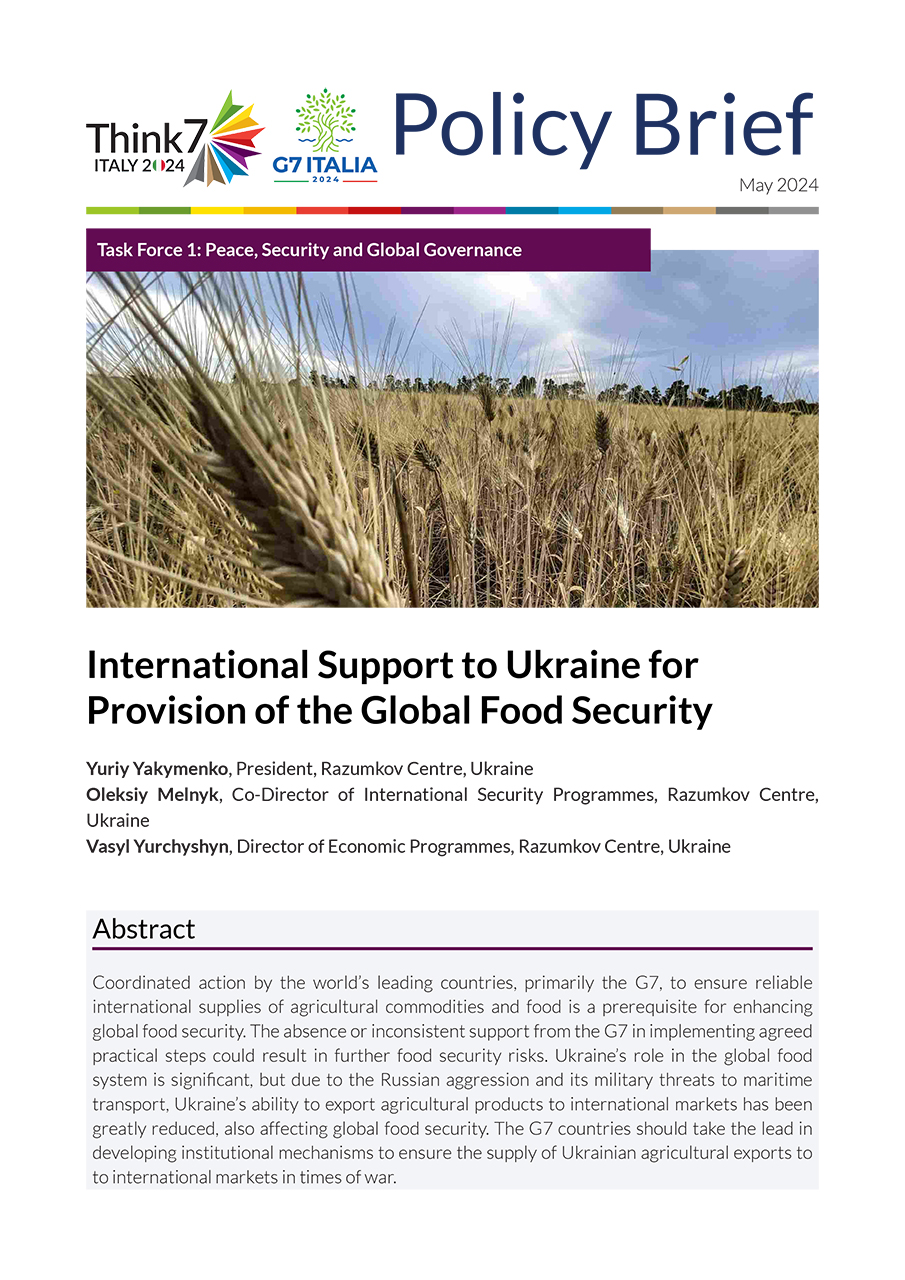
Coordinated action by the world’s leading countries, primarily the G7, to ensure reliable international supplies of agricultural commodities and food is a prerequisite for enhancing global food security. The absence or inconsistent support from the G7 in implementing agreed practical steps could result in further food security risks. Ukraine’s role in the global food system is significant, but due to the Russian aggression and its military threats to maritime transport, Ukraine’s ability to export agricultural products to international markets has been greatly reduced, also affecting global food security. The G7 countries should take the lead in developing institutional mechanisms to ensure the supply of Ukrainian agricultural exports to to international markets in times of war.
Peace Summit: Geopolitical Context And Strategic Outlook
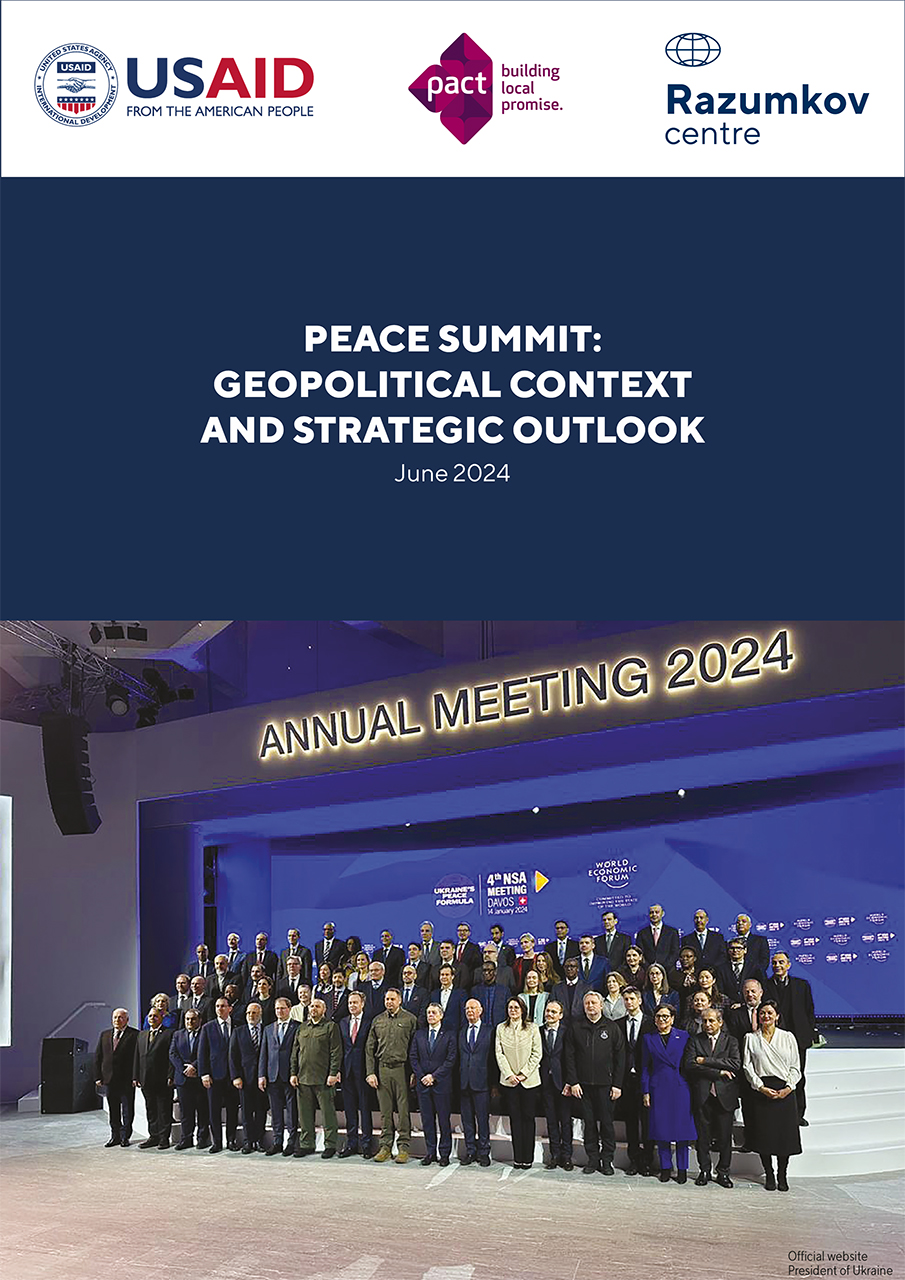
The Peace Summit, scheduled to take place in Switzerland on 15-16 June 2024, is Kyiv’s strategic initiative of regional and global scale and significance. After being presented in the autumn of 2022, the peace summit has become one of the main foreign policy priorities that Ukrainian diplomacy has been persistently promoting across the globe, at all levels and international platforms.
However, it should be borne in mind that the summit, albeit important, but only initial stage of a complex political and diplomatic process. Moreover, it is an integral part of ending the war in Ukraine. Therefore, the summit’s success depends on many other factors, including the Ukrainian Armed Forces’ ability to resist russian intervention, international assistance, and the determination and unity of allied countries.
Human Capital — Challenges for Ukraine’s Recovery
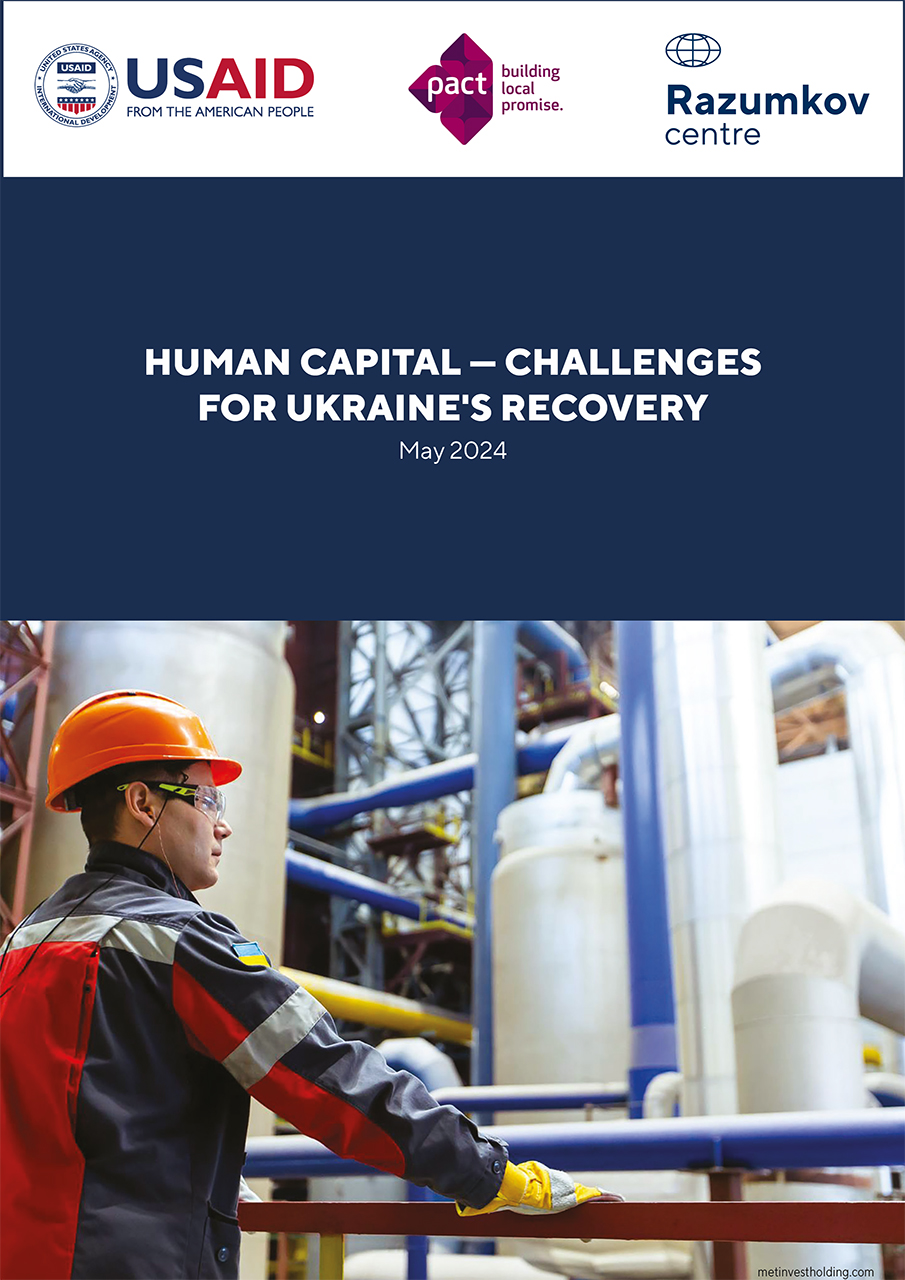
Despite two years of full-scale war, Ukraine has managed to endure with dignity and is currently going through qualitative changes that reflect structural shifts, and quantitative changes that demonstrate businesses’ adaptation to the conditions of war, population’s unity, and the state’s leadership in the face of significant international financial support. Ukraine’s economy is gradually taking on the features of a wartime economy. 2023 saw the beginning of the country’s economic recovery, with GDP growing by more than 5%.
This positive trend can largely be attributed to the systematic inflow of international financial assistance. In 2022 and 2023, Ukraine received $74 billion in external financing1 and assembled a «financial coalition» to support its budget. The systematic financial support from international partners has helped mitigate the effects of lost demand caused by migration and logistical problems by expanding budget financing.
Rapprochement Intentions or Readiness for Disengagement
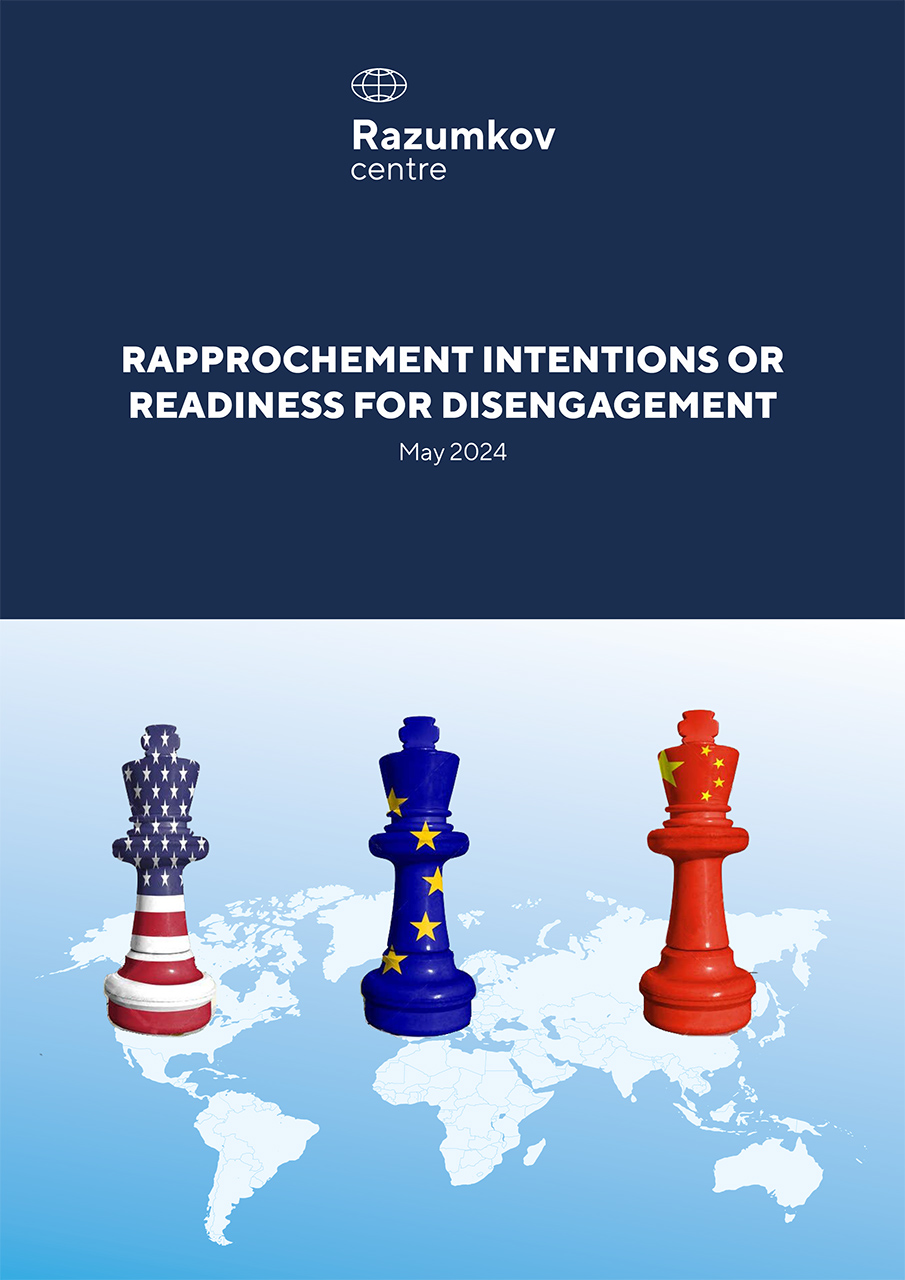
In the mid-2010s, global geopolitics was dominated by seemingly unquestionable ideologemes about the world order and its immediate prospects. It was believed that:
- Euro-Atlantic solidarity was protected by the American «security umbrella» that would further strengthen political and economic ties across the Atlantic;
- ...
How Realistic Are France’s Ambitions for Leadership?

Since the beginning of 2024, France has somewhat unexpectedly stood out among the founding members of the EU and NATO with rhetoric clearly aimed at supporting Ukraine’s victory in its war against Russia and providing Ukraine with all possible assistance in its intentions to join the EU and NATO. On 27 February 2024, French President Emmanuel Macron even suggested that Western countries might have to send their troops to Ukraine, causing disapproval from Germany and the United States. While the French leadership then had to clarify that they did not intend for Western involvement in the fighting in Ukraine, President Macron’s remark did spark reactions from the Western world, China, and Russia, showing France’s desire to strengthen its global role.
War, Integration And The Black Sea Factor: Undervalued Opportunities
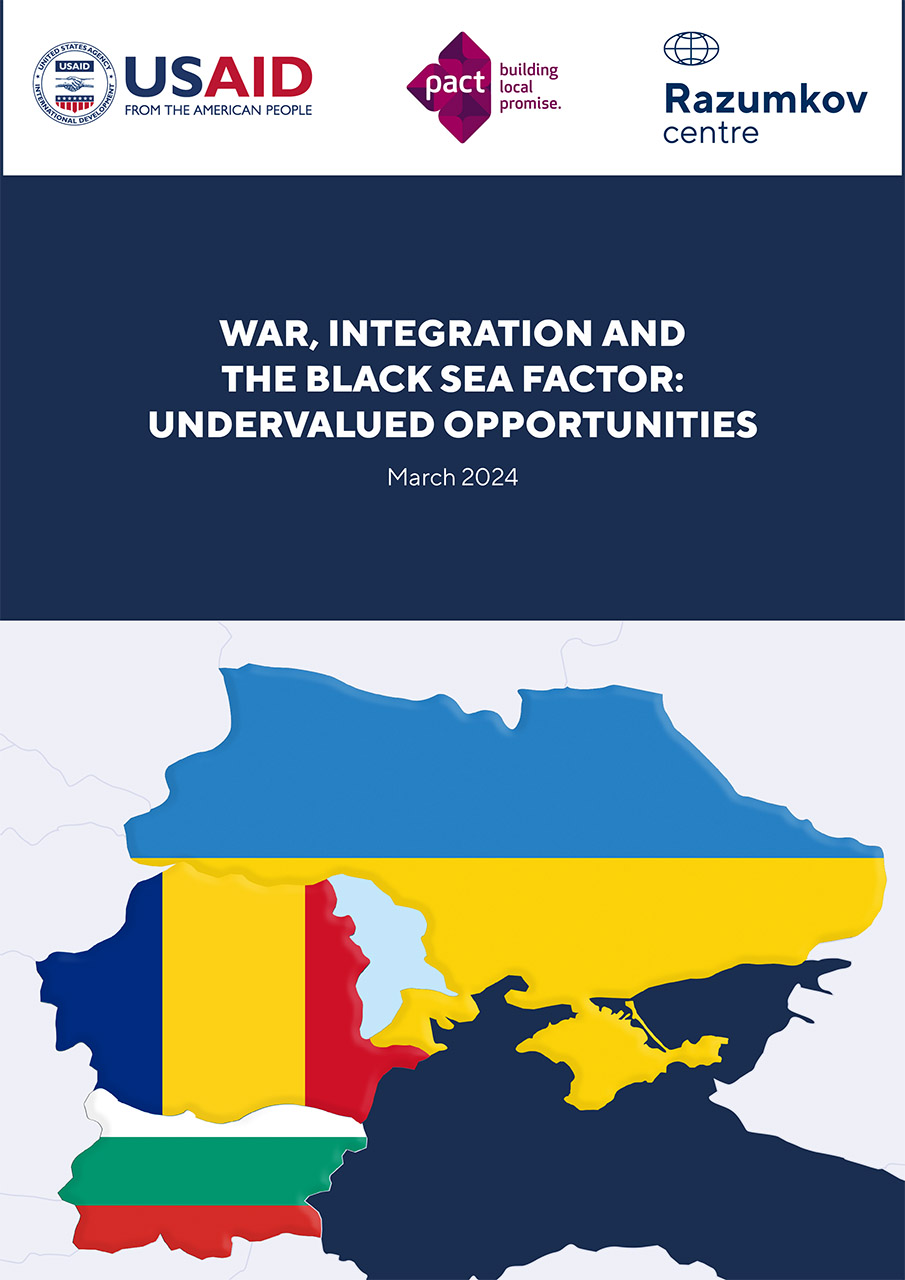
The full-scale war with Russia has had a significant impact on the development of Ukraine’s domestic and foreign policy. For example, after the invasion, Ukrainian society’s vision of European and Euro-Atlantic integration went beyond formal EU and NATO accession and is now viewed as the only alternative for further civilisational development. This is obviously linked to expectations of support in confronting the enemy, as well as hopes for post-war recovery, macroeconomic stability, competitiveness of domestic business, and improved well-being of households.
Ukraine’s Foreign Policy In the Context Of Geopolitical Processes
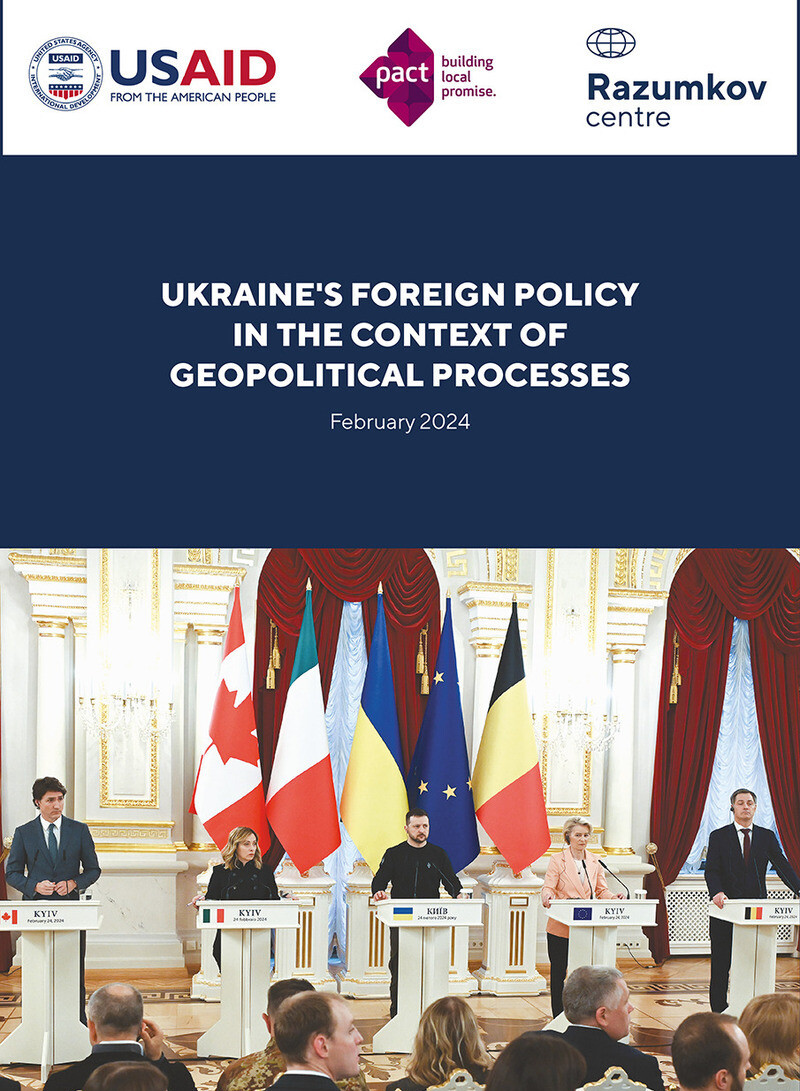
Ukrainian diplomacy operates against the backdrop and under the influence of external events and fast-paced global and regional processes that present both opportunities and challenges for our country. In particular, the world faces deepening polarisation, confrontations between global powers, explosive conflicts in various regions, internal political processes in the United States and the European Union, and so on.
Despite these challenges, Ukrainian diplomacy has shown initiative and innovative approaches in promoting national interests, particularly during russian aggression. Significant achievements include the European Council’s decision in December 2023 to open Ukraine’s EU membership negotiations, the launch of long—term security cooperation agreements with allied countries, etc. At the same time, involvement in a long and exhausting confrontation with the aggressor accumulates «political and economic fatigue» from the Ukraine war, reshapes the geopolitical landscape, exacerbates old and creates new threats.
Therefore, foreign policy must adapt to new geopolitical realities and crises, taking into account the positions and interests of allied countries. Therefore, it is crucial to analyse and forecast external trends and develop preventive countermeasures in various areas.
Leadership Transformations In the Indo-Pacific
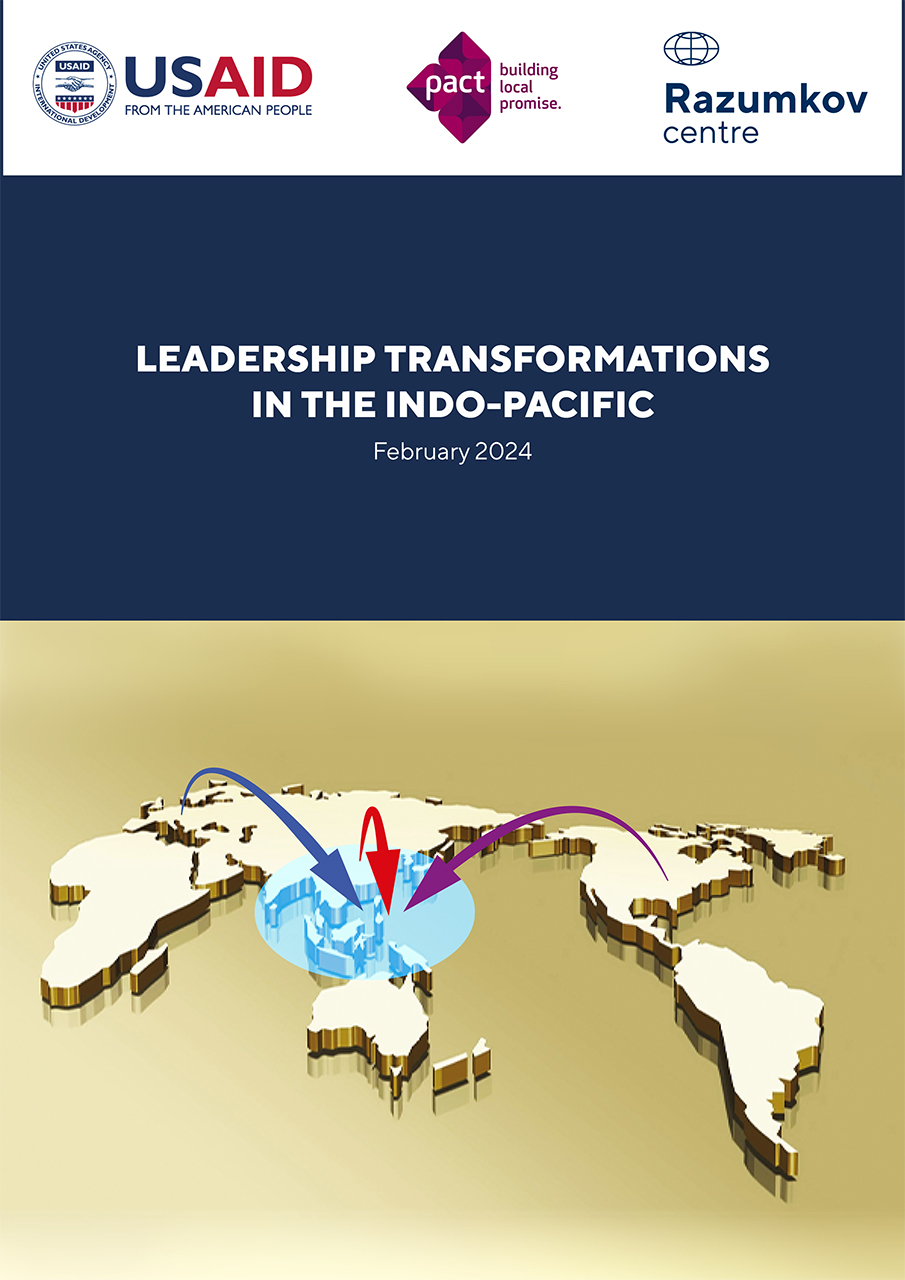
The beginning of 2024 was marked by the wars in Ukraine and the Middle East, political passions in the USA, tension in Europe, economic difficulties in China, which noticeably weakened attention to events and processes in other parts of the world, including those lying at the intersection of the interests or influences of the world’s leading powers or institutions. However, changes in those regions in 2024 promise to be highly controversial and conflict-prone, fraught with global risks and challenges.
Until now, it was clear to everyone that global events and processes were driven (directly or indirectly) by the US, China and their rivalry. Today, there is an impression that the situation in the world will take on significantly different features, and the year 2024 may turn out to be a year of losses and discord, even in those areas or spheres that seemed well-established and associated with democracy, economic development and human values.
Germany on the Way To Regaining Its Leadership
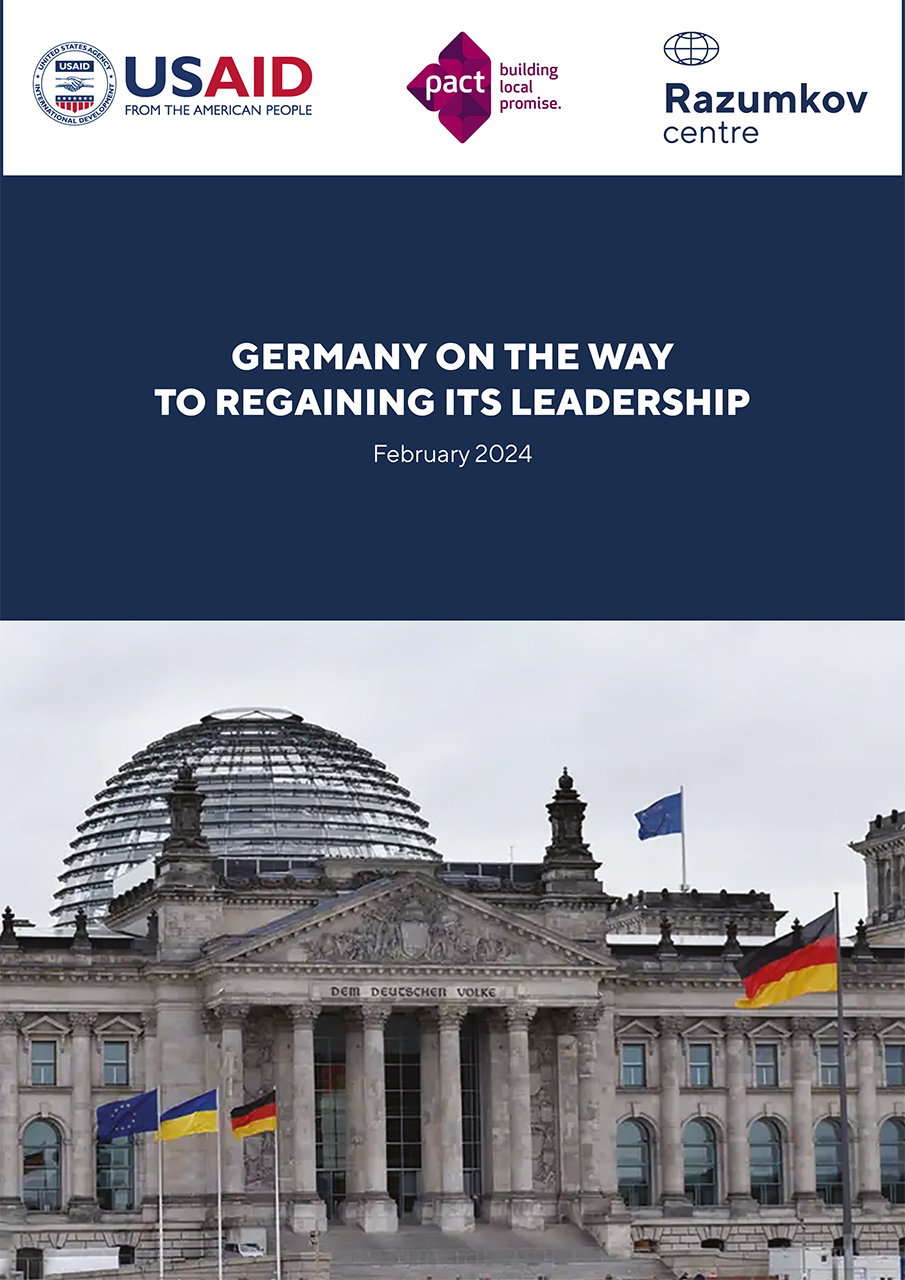
Now, at the start of 2024, Ukraine faces new challenges related with the prospects of its successful fight with the Russian aggressor. On the one hand, thanks to the partner support of democratic countries, Ukraine has proven its civilizational capacity, established itself as a freedom-loving country, and should multiply efforts to build and strengthen a democratic society and join the European community.
Ideology Behind Restoration Of Economic Liberties
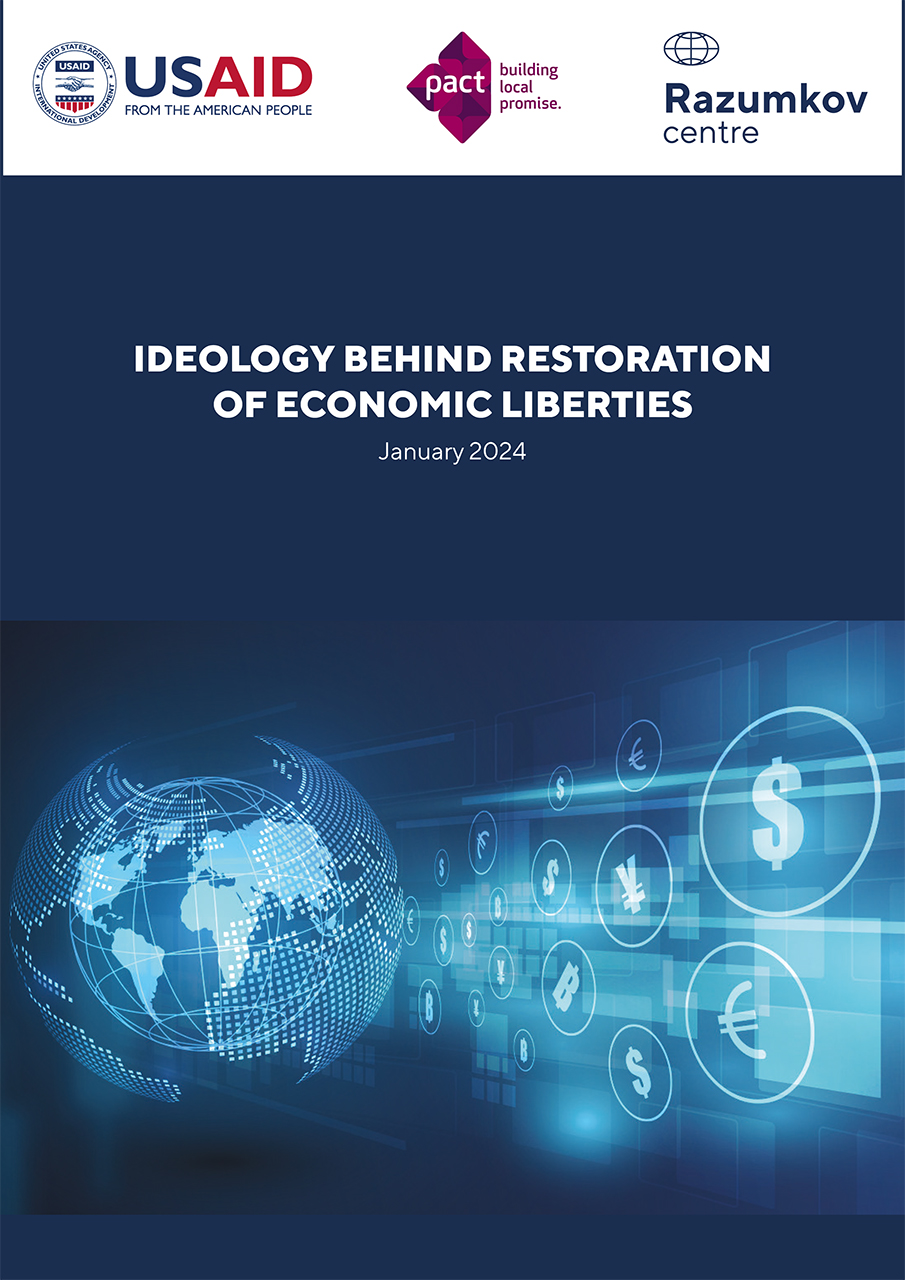
For humanity, the early 2020s were marked with the growth of risks and challenges, which can slow down the generally positive dynamics of global development in previous years.
This was not unexpected, since the period after the Global Financial Crisis of 2008-2009 brought signs of slowdown of global development, primarily due to the weakening of economic liberties — re-establishment of protectionist measures, cross-border barriers for the movement of goods, services, capital, people, which gave grounds to predict the emergence of a new global agenda: de-globalisation, increased isolation, and formation of new centres of political and economic gravity.
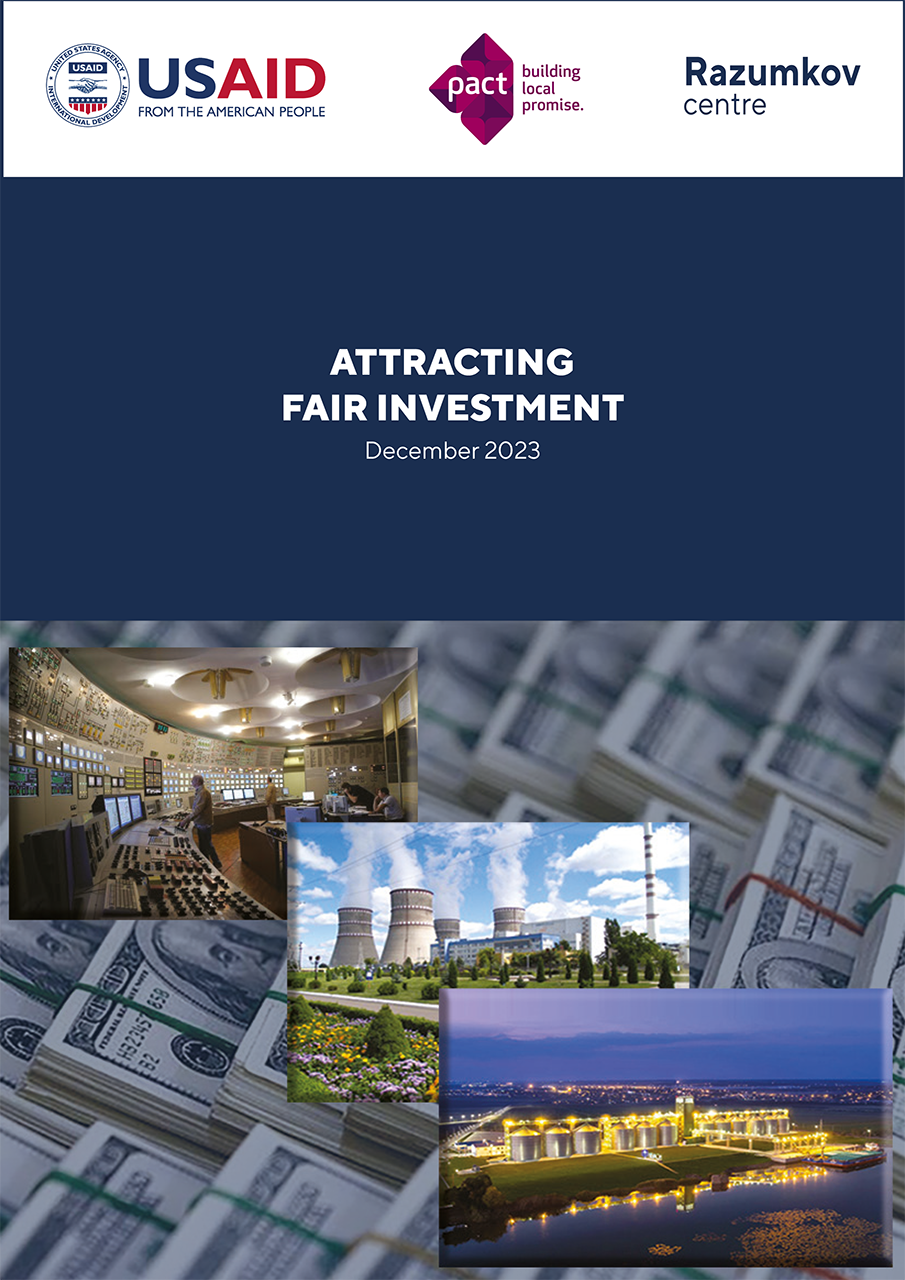
This publication was conducted by Razumkov Centre as part of its project implemented under the USAID/ENGAGE activity, which is funded by the United States Agency for International Development (USAID) and implemented by Pact. The contents of this publication are the sole responsibility of Pact and its implementing partners and do not necessary reflect the views of USAID or the United States Government.
The global environment has become increasingly risky in recent years. The coronavirus crisis, russian aggression, Hamas attacks, migration waves, price shocks in the energy and agricultural markets, trade, fiscal and debt imbalances, and contradictory intentions and actions of major global actors have created complex chains of critical political and economic interdependence between countries, which increasingly hinders joint consolidating efforts and actions capable of ensuring sustainable socio-economic development of countries around the world.
It is undeniable that Ukraine, like any other country, desperately needs investment resources to accelerate its economic recovery. In the previous decades, the country failed to become attractive to investors, and even experienced a leaching of national capital (including human capital), which accelerated with the expansion of russian aggression. Therefore, when it comes to Ukraine’s post-war recovery, one needs to recognise that with no international investment, the task of building a new civilised country will be postponed for the unforeseeable future.
It should be stressed that foreign investment is no longer just an economic factor of development but is increasingly gaining security implications. Moreover, the country’s best defence against encroachments is the arrival of an international investor — the higher the volume of foreign investment, primarily from developed democracies, the more secure the country can feel against an uninvited imperial aggressor. Therefore, the attitude towards attracting foreign investment is increasingly subject to adjustment.
Vectors of Effective Support For Ukraine
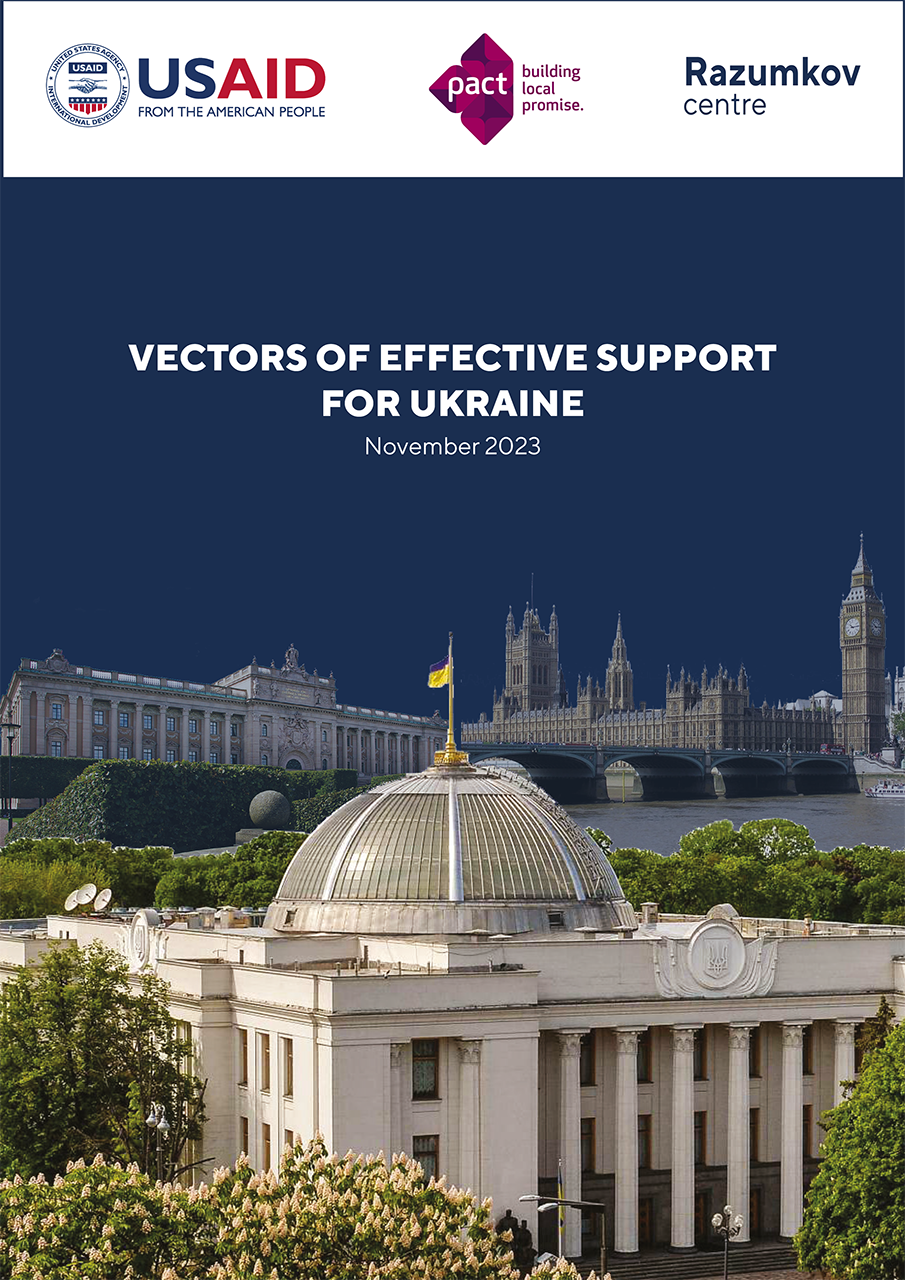
This publication was conducted by Razumkov Centre as part of its project implemented under the USAID/ENGAGE activity, which is funded by the United States Agency for International Development (USAID) and implemented by Pact. The contents of this publication are the sole responsibility of Pact and its implementing partners and do not necessary reflect the views of USAID or the United States Government.
The last five years of global development have been increasingly marked by unparalleled global risks, challenges and even disastrous processes that, originating in individual countries or regions, quickly gain a threatening scale and impact, cause numerous human losses, and accelerate systemic changes in the socio-political and socio-economic environments of almost all countries. These challenges for humanity include the coronavirus crisis, large-scale russian aggression against Ukraine, and the war in the Middle East.
For Ukraine, the most significant threats and challenges are obviously related to its struggle for independence and freedom against russian imperialism. Partner assistance from the world’s leading democracies is undoubtedly a critical component of this struggle. Crises triggered by global challenges could not but have a negative impact even on strong and developed economies, causing problems in production and logistics chains, financial and currency markets, corporate and public budgets and debt balances. And today, Ukraine is clearly interested in the accelerated renewal of partner countries’ sustainable development, as this directly affects the scale of their continued security, economic and humanitarian support to a country that is courageously fighting for freedom and independence.
The Initial Market Reaction To Russia and Hamas’ Aggression
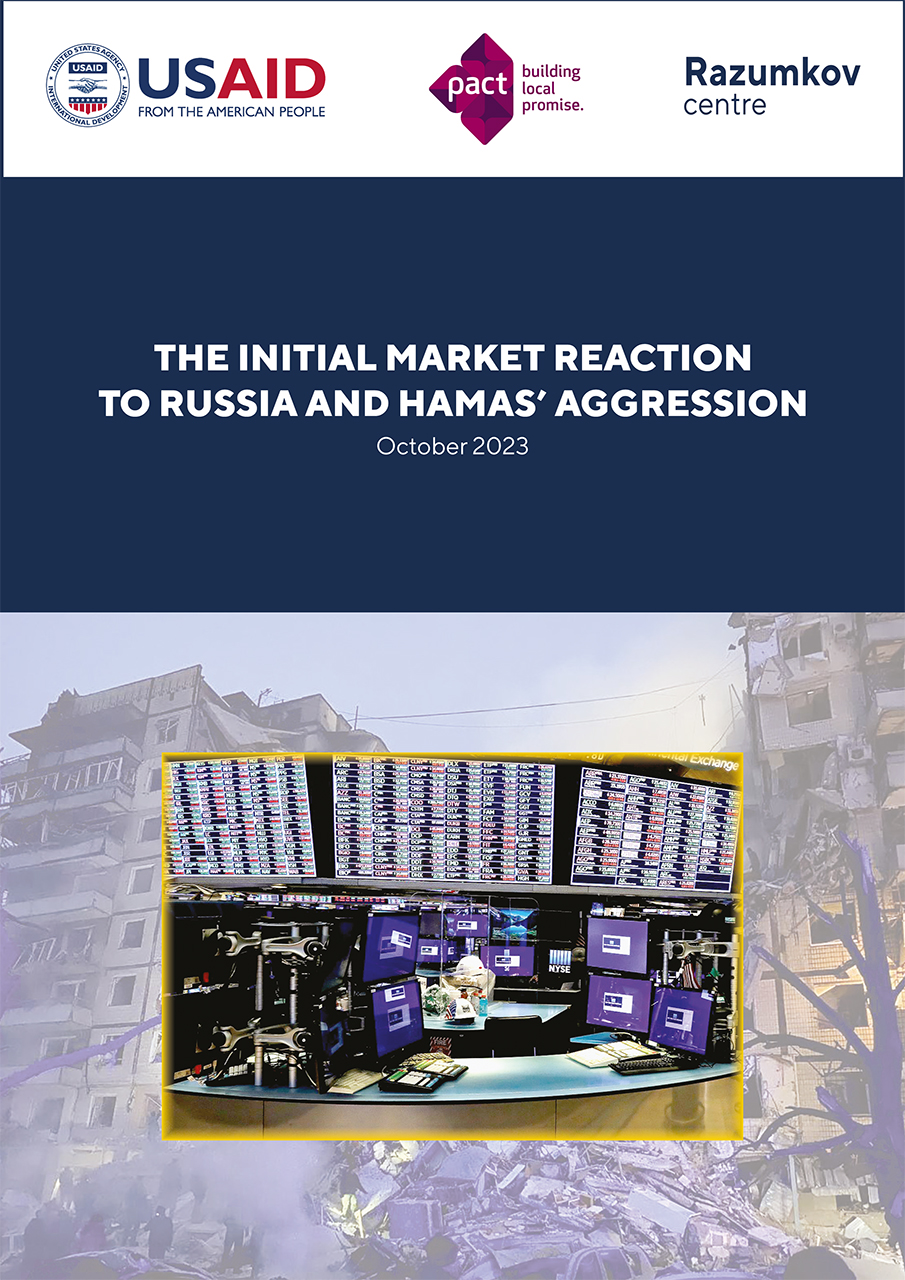
This publication was conducted by Razumkov Centre as part of its project implemented under the USAID/ENGAGE activity, which is funded by the United States Agency for International Development (USAID) and implemented by Pact. The contents of this publication are the sole responsibility of Pact and its implementing partners and do not necessary reflect the views of USAID or the United States Government.
Ukraine’s struggle against russian aggression, which has had, is having and will have a significant impact on the geopolitical and geo-economic map of the world, has already pinpointed the contradictory risks and challenges of modern confrontation between democratic and autocratic societies, and demonstrated the high interdependence of events and processes even in the most remote countries.
Savings and the risks of debt crises
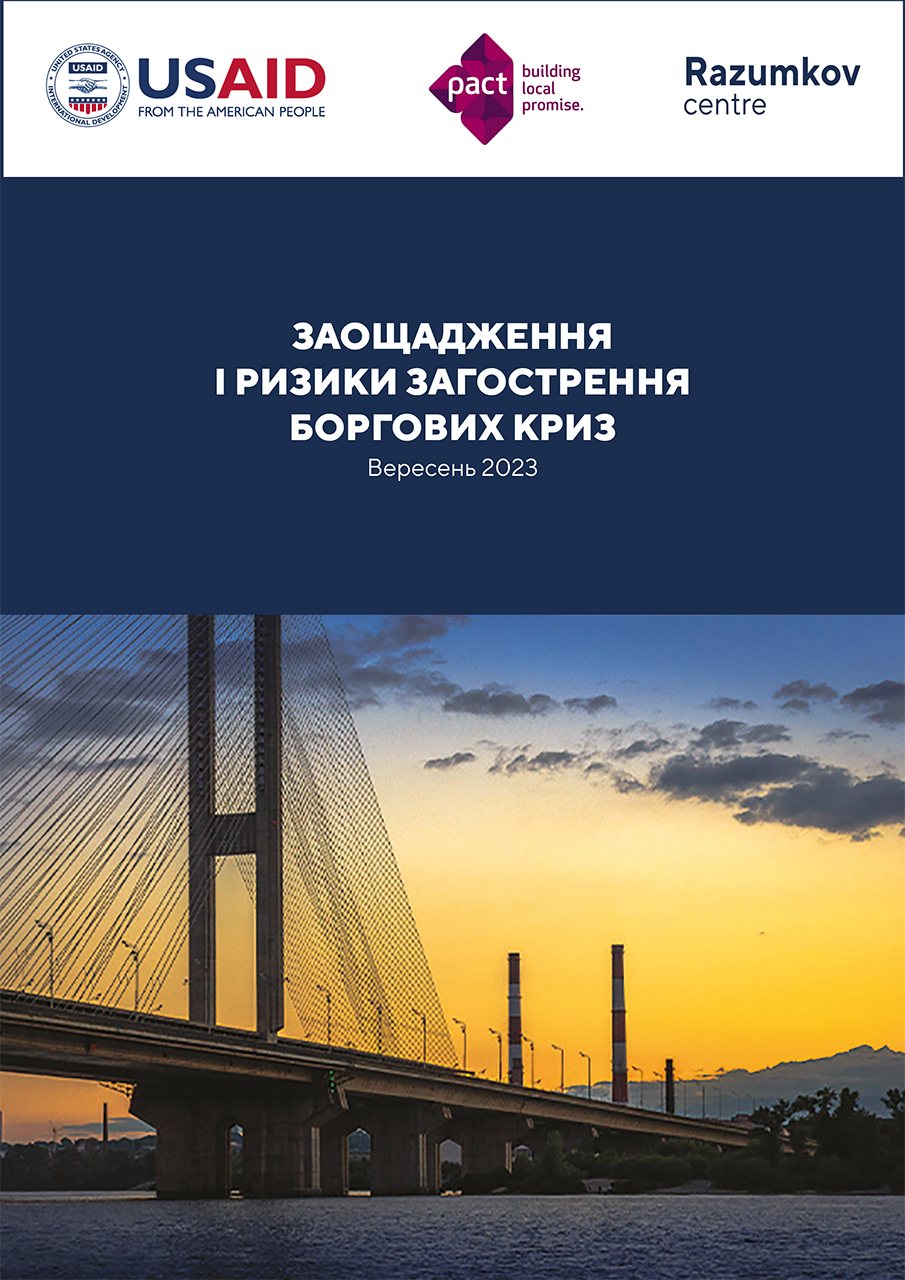
Ukraine will enter the post-war recovery extremely weakened economically requiring significant assistance and support from partner countries to implement a prudent economic policy for accelerated growth. Of course, such growth is only possible if the world’s largest economies, on whose support Ukraine relies, are in good financial health.
Since global economic processes are increasingly determined by the economic dynamics and interactions between the two giants, the United States and China, the problems associated with the high debt burden of these largest economies could quickly affect the global debt environment, and thus cause significant default risks for many emerging economies, which would certainly slow down their socio-economic development.
Obviously, the scenario of a global debt crisis is highly unacceptable for Ukraine, as it will require support from the global financial community for many years to come. In the meantime, only structural changes in the domestic economy can generate the resources that will allow the country to lay the foundation for socio-economic development, and it is the growth of value added at a faster rate than inflation that will create the conditions for maintaining the current level of welfare and increasing domestic savings, thus reducing debt pressure.
As the victory approaches, more and more “friends” will recommend Ukraine rapid recovery scenarios. However, the country should not be tempted by the compromise solutions of those “peacekeeping” countries that directly or indirectly maintain extensive contacts with the aggressor or implement policies that contradict Ukraine’s national interests, or, in the settings of the global community’s polarisation, disregard the geopolitical and geo-economic interests of Ukraine’s strategic partners.
The full text of analytical report in Ukrainian is available HERE
War of Attrition: Comparing Capabilities
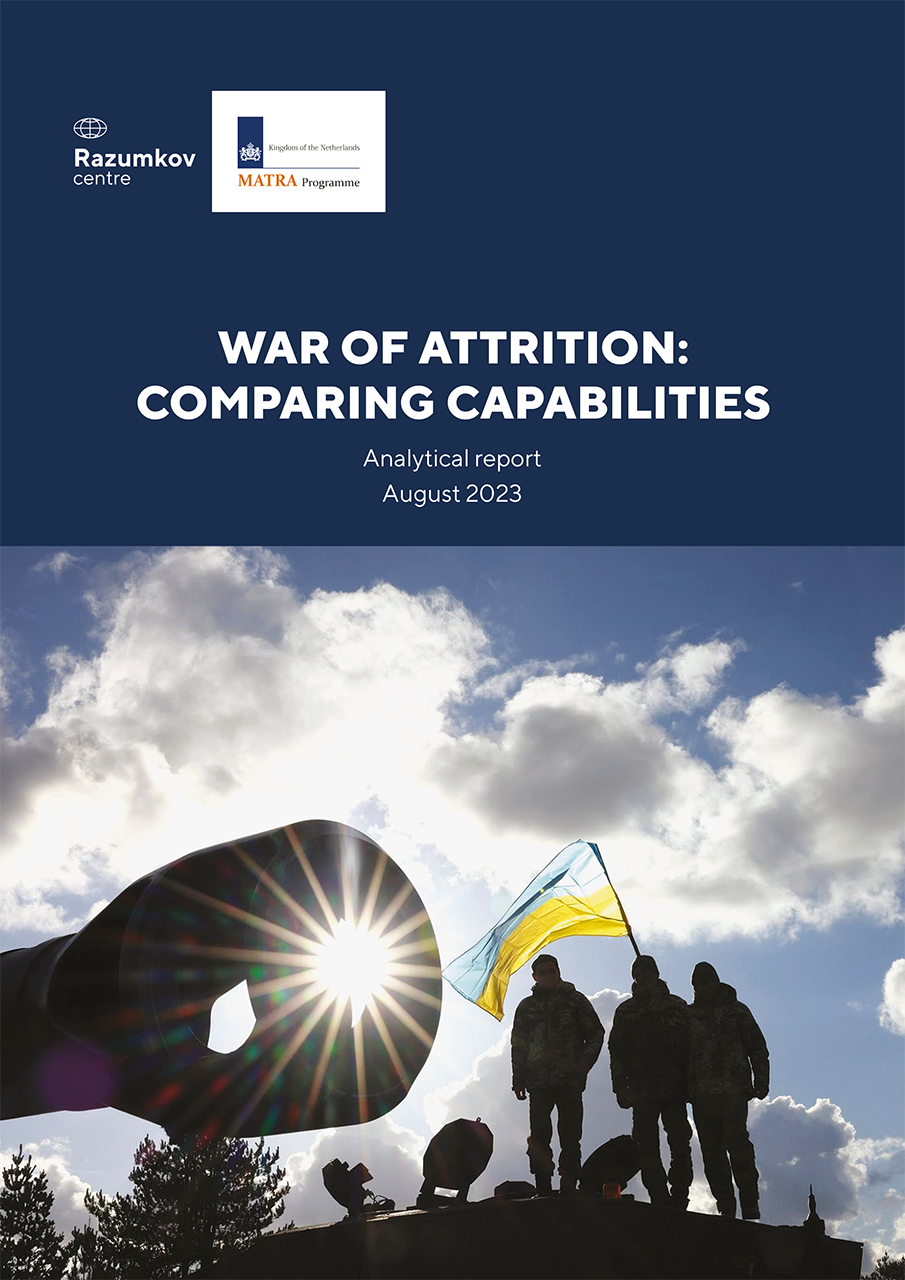
This publication has been made within the framework of the MATRA Programme supported by the Embassy of the Kingdom of the Netherlands in Ukraine. The opinions expressed are those of the authors only and should not be considered as representative of the Embassy’s official position.
Mykola SUNGUROVSKYI, Director, Military Programmes of the Razumkov Centre
Oleksiy MELNYK, Co-Director, Foreign Relations and International Security Programmes of the Razumkov Centre
The Russia-Ukraine conflict has approached yet another critical phase that could become a turning point in the war, or at least determine the further course of events more clearly. It is needles to repeat about the global significance of the issues that Ukrainian defenders are addressing now. Ukraine’s military success will not only determine the fate of our country, but also shape the prospects for security and stability around the world.
Ensuring the Irreversibility Of Ukraine’s European And Euro-Atlantic Course
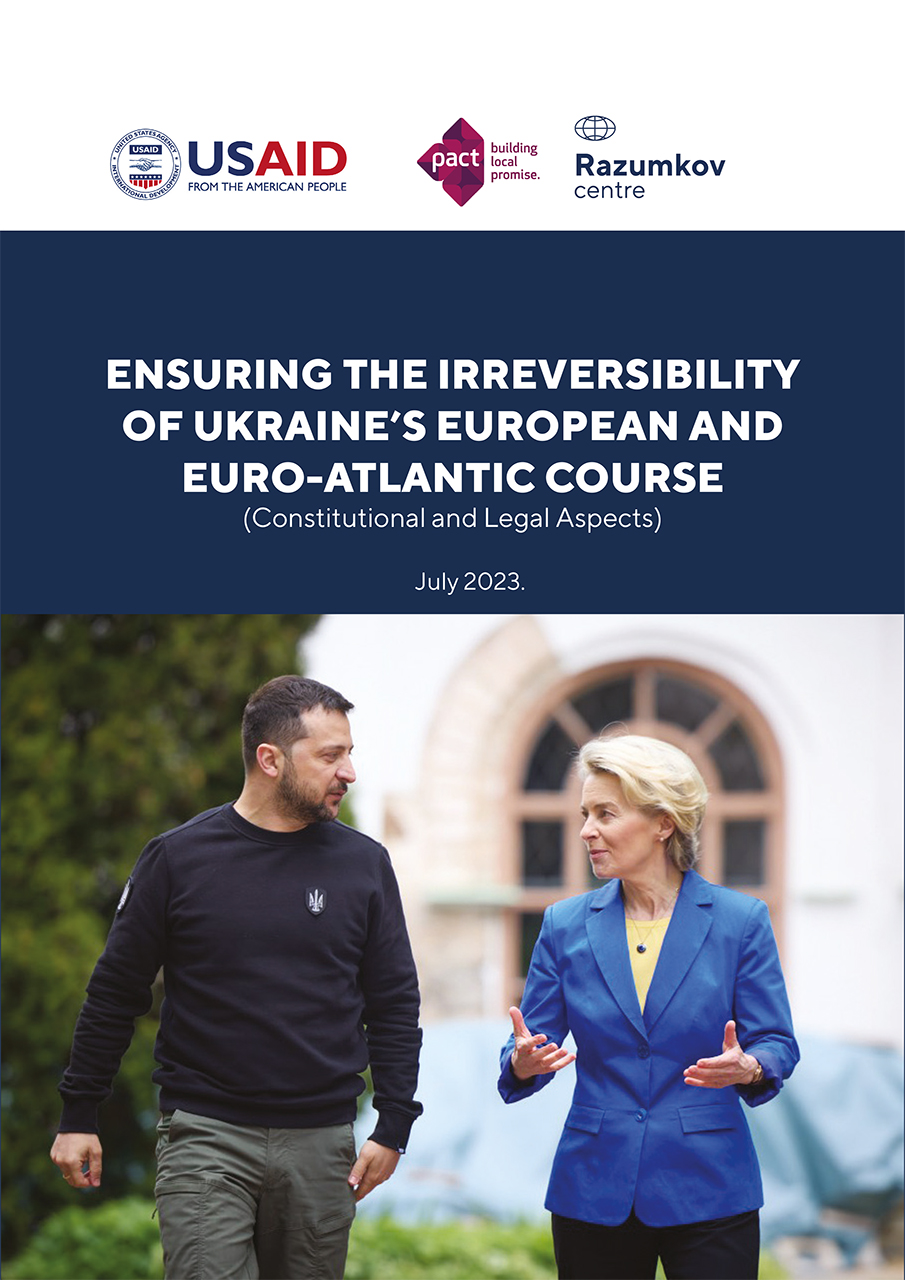
This publication was presented by the Razumkov Centre as part of the Pact’s ENGAGE (Enhance Non-Governmental Actors and Grassroots Engagement) program in Ukraine funded by the United States Agency for International Development (USAID).
The contents of this analytical report are the sole responsibility of Pact and its partners and do not necessary reflect the views of USAID or the United States Government.
June 25, 2023 marked a year since Ukraine was granted the candidate status for membership in the European Union, by virtue whereof the European Commission has issued an oral update on Ukraine’s progress in fulfilling conditions to launch EU membership talks. According to European colleagues, Ukraine has fully met two out of seven criteria and has made significant «progress»ь in implementing the other five «recommendations», formulated along with Ukraine getting the EU candidate status.
Economic Reasons of the Return
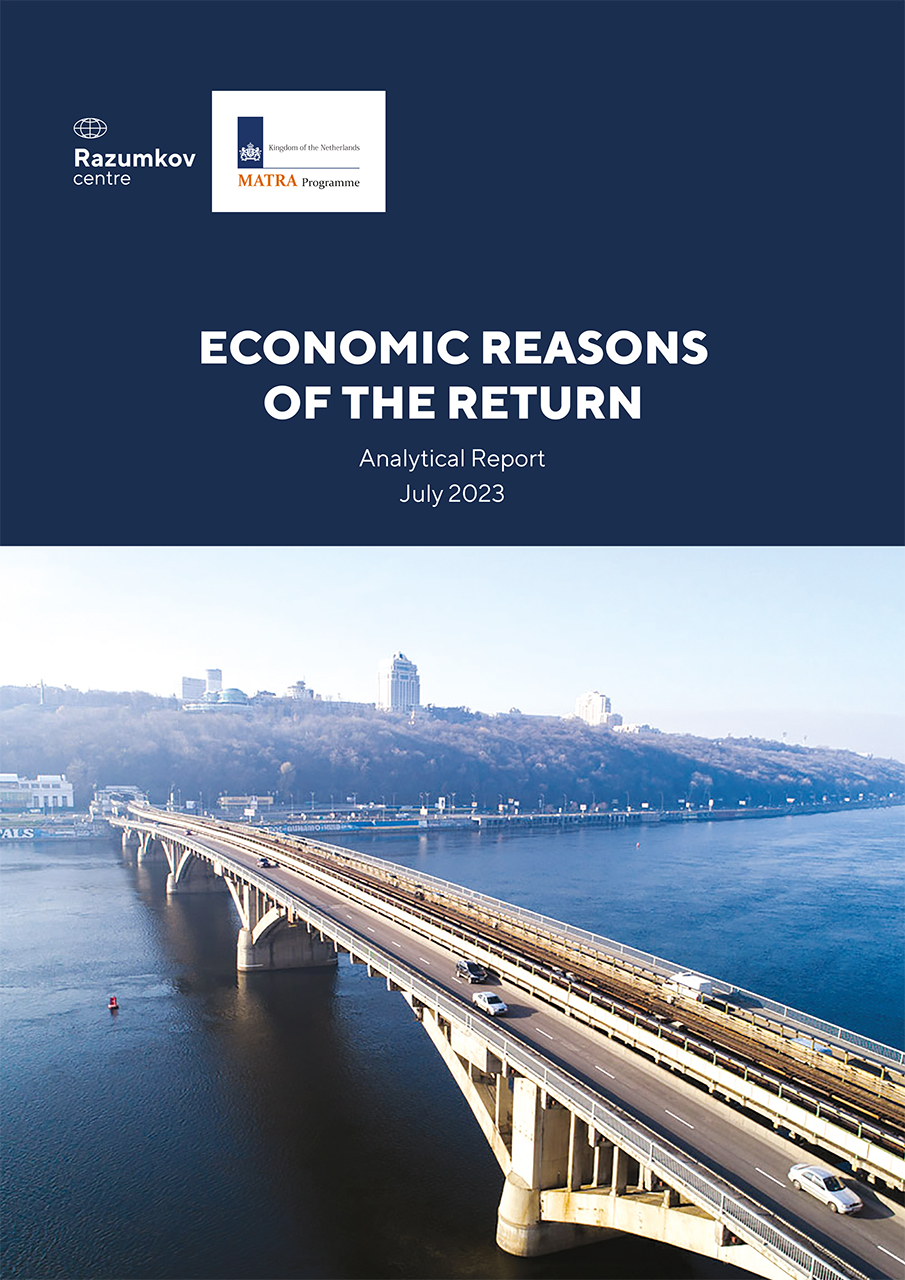
This publication has been made within the framework of the MATRA Programme supported by the Embassy of the Kingdom of the Netherlands in Ukraine. The authors’ assessments and conclusions should not be considered as representative of the Embassy’s official position.
As has been repeatedly emphasised, human capital is the most important factor in ensuring the country’s socio-economic development, improving competitiveness of the national economy, and providing for decent well-being of households.1 A necessary prerequisite for the country’s development is, of course, the formation of a strong economic potential and its translation into real growth, which, among other things, should be based on minimising unemployment and directing society towards full employment.
Global Energy Markey Outlook in 2022
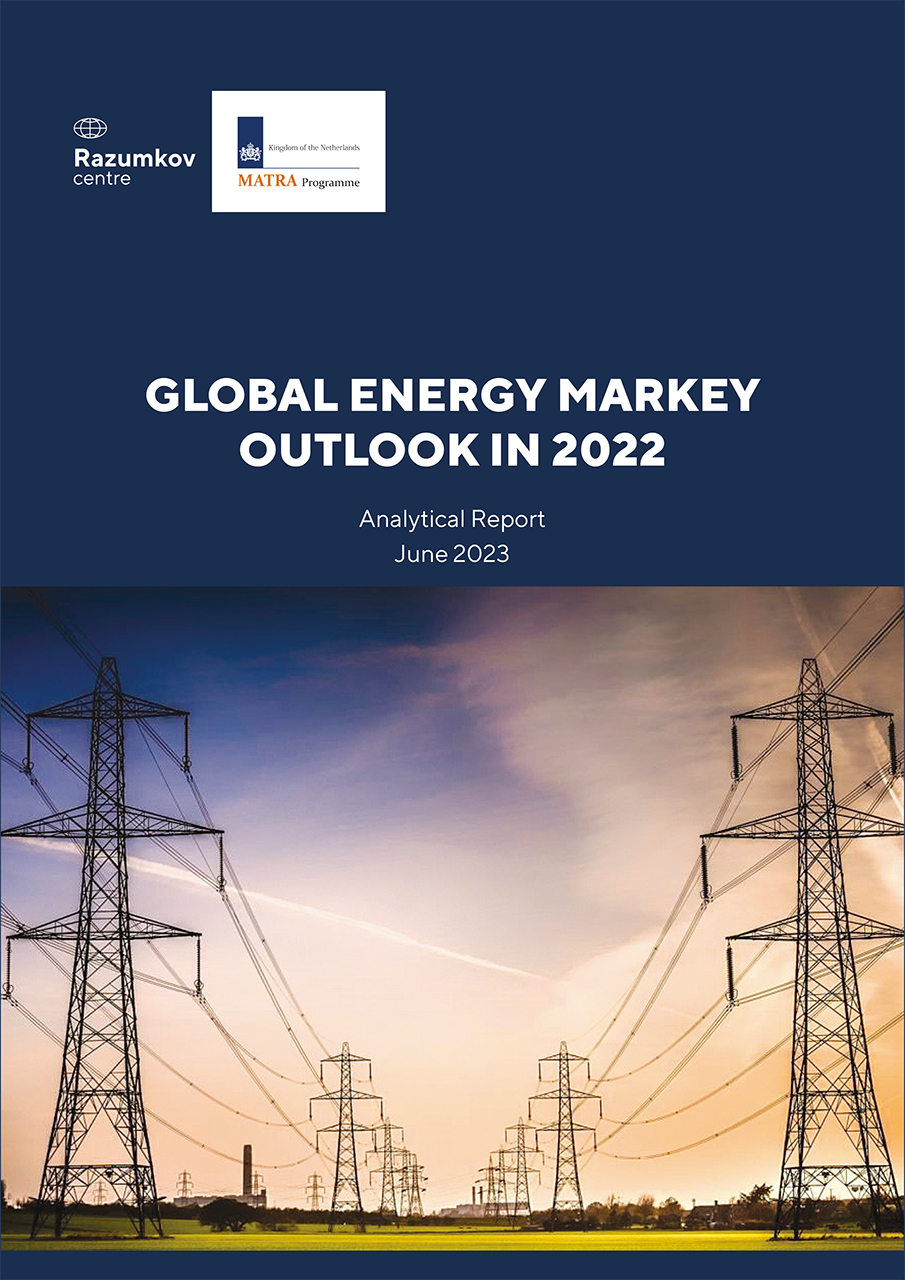
This publication has been made within the framework of the MATRA Programme supported by the Embassy of the Kingdom of the Netherlands in Ukraine. The opinions expressed are those of the authors only and should not be considered as representative of the Embassy’s official position.
Analysing the situation on global energy markets in 2022, this year can be described as the most difficult for energy consumers since the major oil crisis of 1973 caused by the escalation of the Arab-Israeli conflict.
The main reason for skyrocketing energy prices in Europe in 2022 was Russia’s use of energy weapons against the EU by limiting supply of natural gas via Gazprom’s breach of contractual obligations and abuse of European gas storage facilities.
State of Ukraine’s Economy And Prospects For Its Recovery in 2023
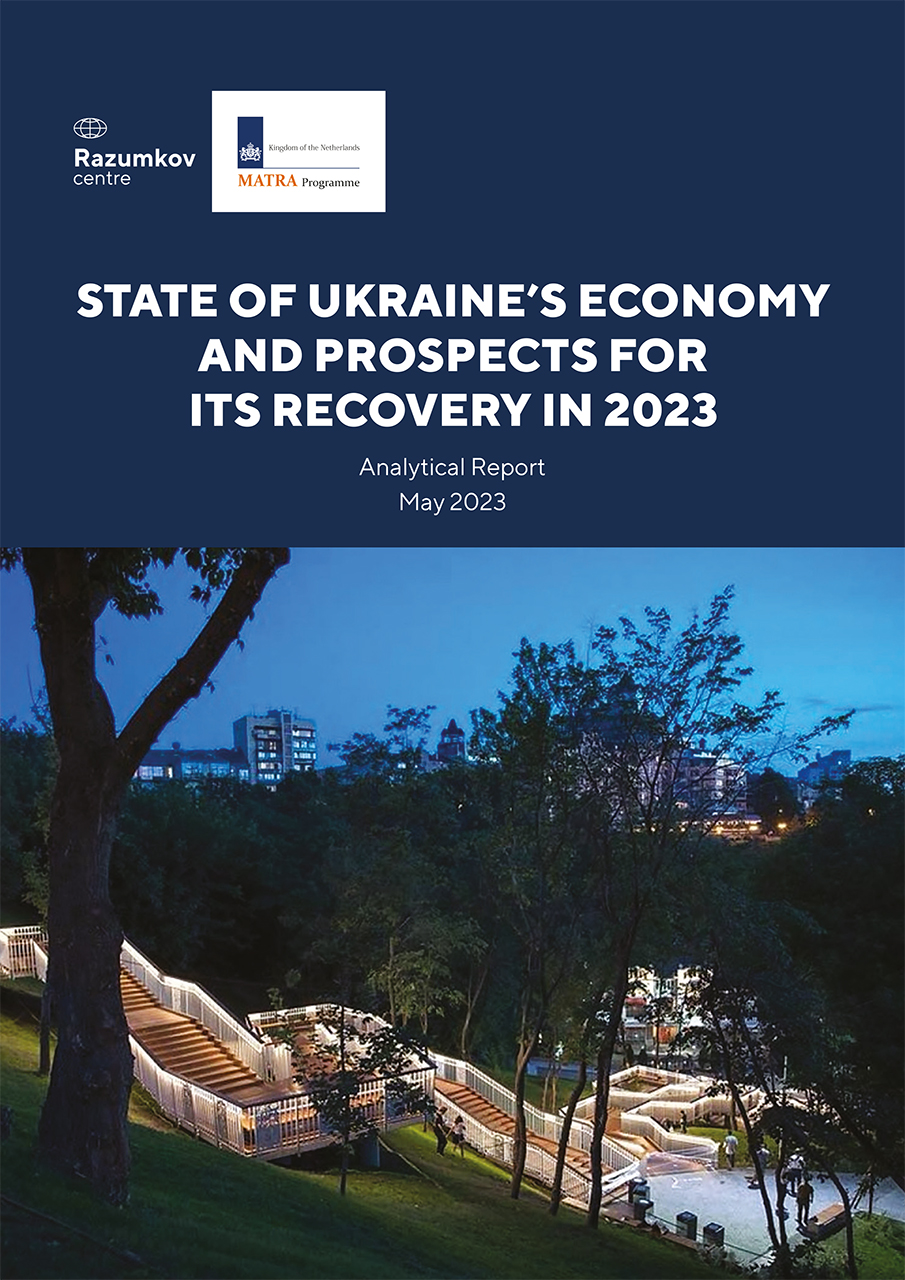
This publication has been made within the framework of the MATRA Programme supported by the Embassy of the Kingdom of the Netherlands in Ukraine. The opinions expressed are those of the authors only and should not be considered as representative of the Embassy’s official position.
Ukraine is undergoing a deep social and economic crisis provoked by Russian aggression. At the same time, Ukraine’s struggle for freedom and independence has improved awareness of its civilizational choice, becoming an additional incentive for the democratisation and economic transformation.
Ukraine’s Foreign Policy In Times of War: Features and Priorities
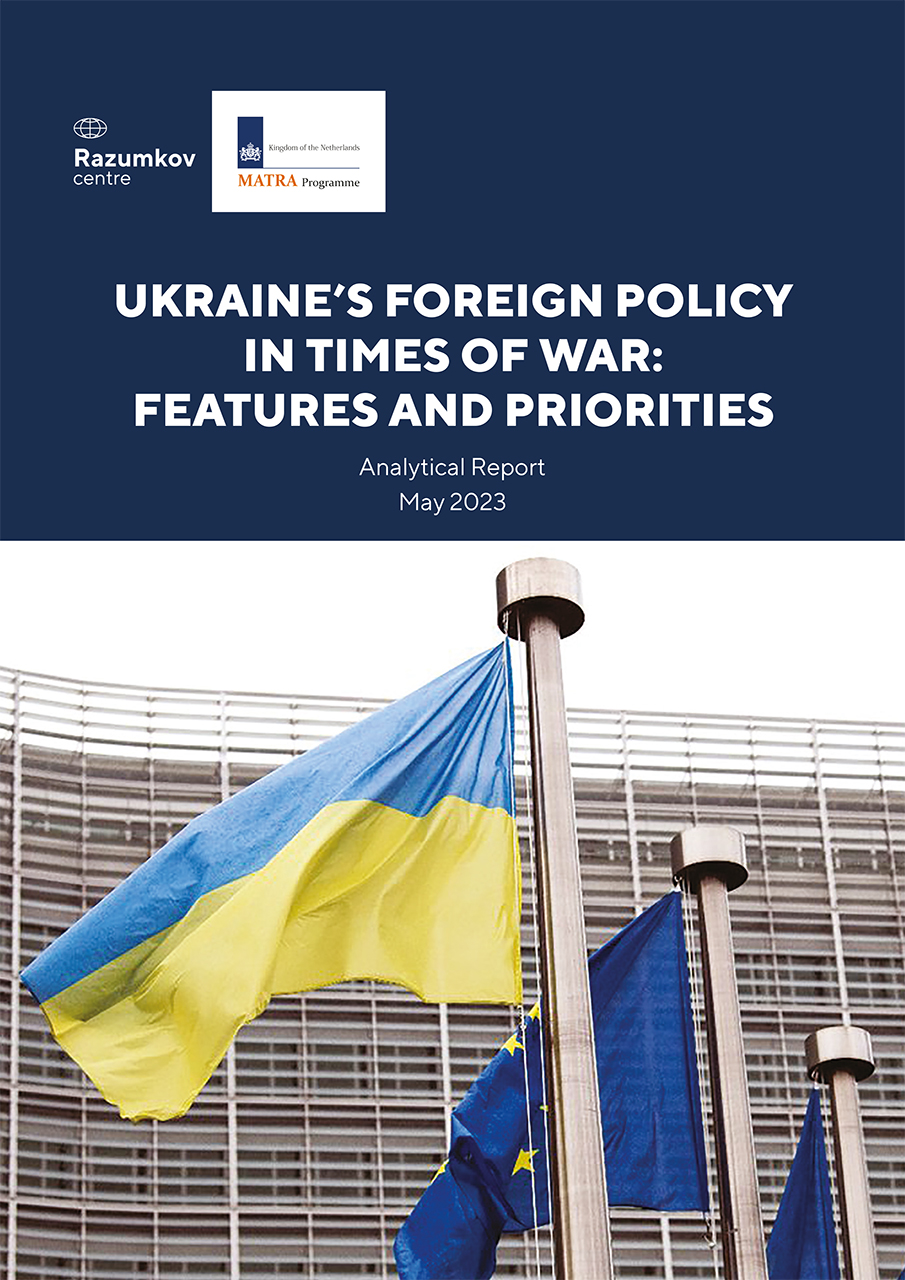
This publication has been made within the framework of the MATRA Programme supported by the Embassy of the Kingdom of the Netherlands in Ukraine. The opinions expressed are those of the authors only and should not be considered as representative of the Embassy’s official position.
Russia’s large-scale war against Ukraine, while provoking a dangerous confrontation between the world’s centres of influence, changed the content and specifics of the activities of the Ukrainian state and society in general and its foreign policy in particular. During the war, and especially amidst large-scale intervention, the nature, means and priorities of Ukrainian diplomacy were transformed. This is a unique experience in the global arena that deserves attention. Some of the peculiarities and features of Kyiv’s foreign policy during the war are outlined in this publication.
Migration Patterns And Impacts: Lessons for Ukraine
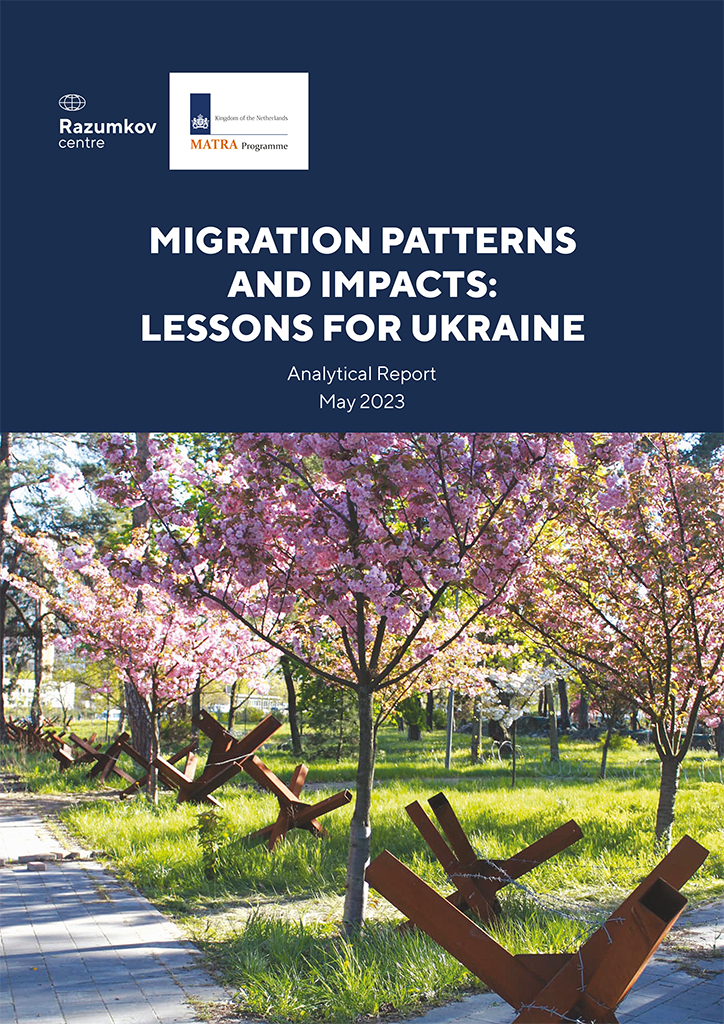
This publication has been made within the framework of the MATRA Programme supported by the Embassy of the Kingdom of the Netherlands in Ukraine. The opinions expressed are those of the authors only and should not be considered as representative of the Embassy’s official position.
Ukraine’s socio-economic after the war recovery should become an absolute priority of state policy and include a number of complex tasks of overcoming catastrophic humanitarian shocks; ensuring accelerated restoration of normal functioning and development of domestic institutions, sectors of the economy and markets; rebuilding housing, transport and social infrastructure; ensuring the development of human potential; and encouraging the growth of positive expectations in Ukrainian society. At the same time, interaction with global actors should be central, in particular, in achieving the social goals set out in the current EU-Ukraine Association Agreement and the tasks associated with Ukraine’s EU candidate status obtained in June 2022.
Asserting Economic Freedom In Ukraine (Analytical Report, April 2023)

This publication has been made within the framework of the MATRA Programme supported by the Embassy of the Kingdom of the Netherlands in Ukraine. The authors’ assessments and conclusions should not be considered as representative of the Embassy’s official position.
See the full report in Ukrainian at https://razumkov.org.ua/images/2023/04/07/2023-MATRA-I-KVARTAL.pdf
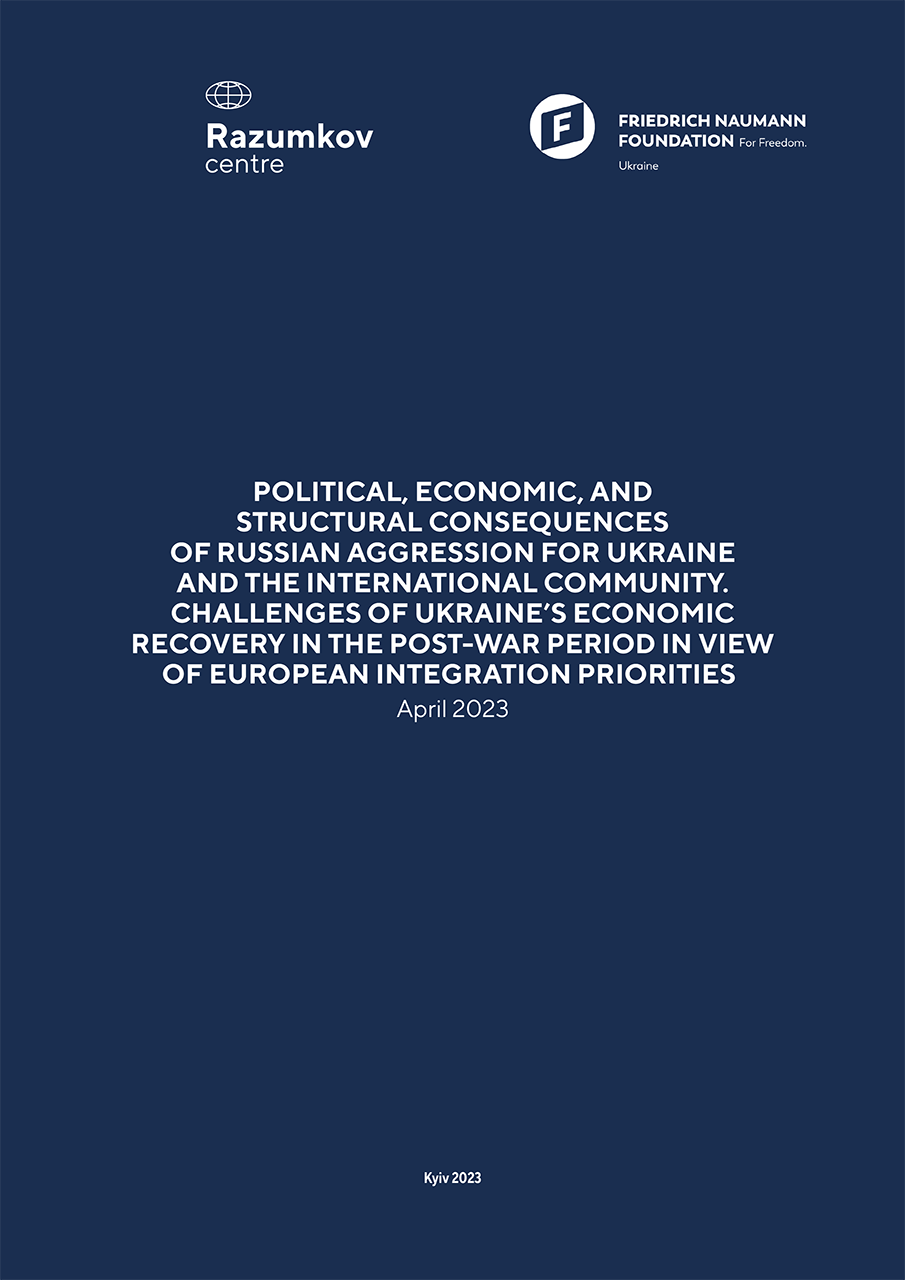
This publication was produced by the Razumkov Centre with the support of the Friedrich Naumann Foundation for Freedom (FNF), Project Office Ukraine. The views expressed by the authors do not necessarily reflect the views of the FNF.
How the World Enters 2023: Economic Prospects For Ukraine’s Recovery
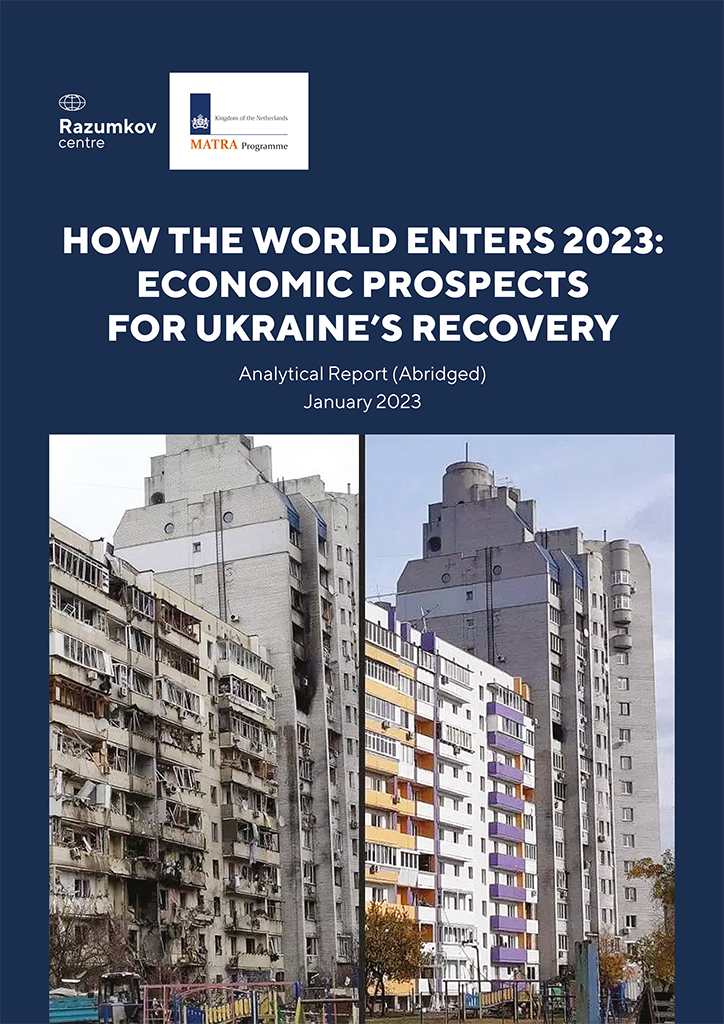
This publication has been made within the framework of the MATRA Programme supported by the Embassy of the Kingdom of the Netherlands in Ukraine. The opinions expressed are those of the authors only and should not be considered as representative of the Embassy’s official position.
Ukraine’s Recovery: Starting Point And Directions Of Government Action
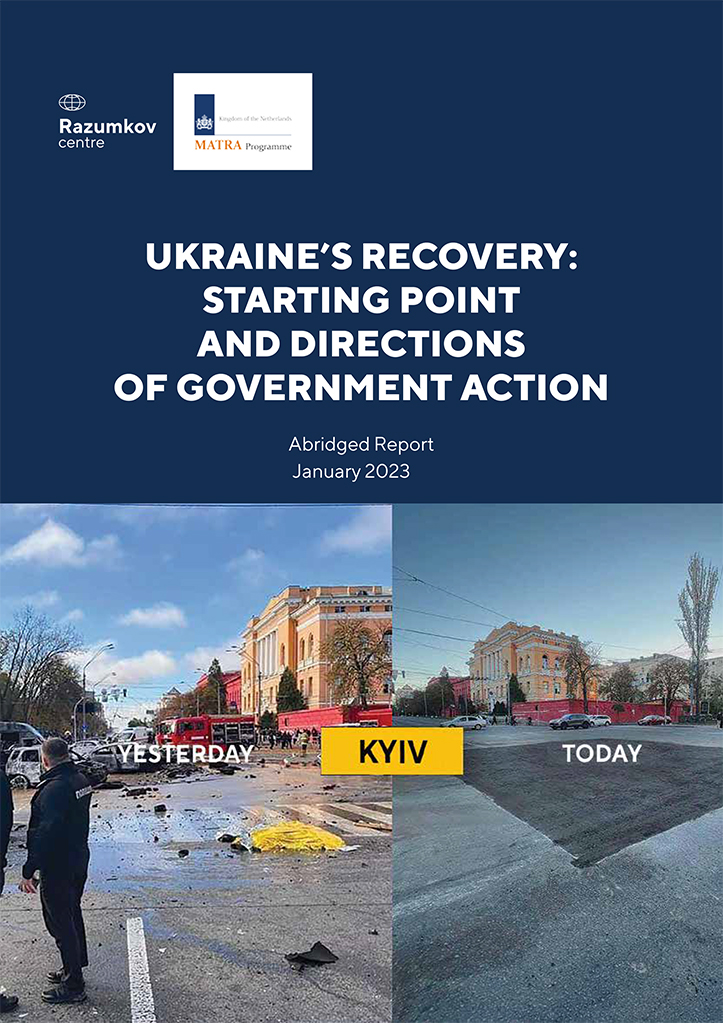
This publication has been made within the frameworks of the MATRA Programme supported by the Embassy of the Kingdom of the Netherlands in Ukraine. The opinions expressed are those of the author(s) only and should not be considered as representative of the Embassy’s official position.
UKRAINE’S RECOVERY: STARTING POINT AND DIRECTIONS OF GOVERNMENT ACTION
Presented at the Round Table «How the world enters 2023: Economic prospects for Ukraine’s recovery» Razumkov Centre, Kyiv, January 2023
RUSSIAN-UKRAINIAN WAR: DEVELOPMENTS AND PROSPECTS
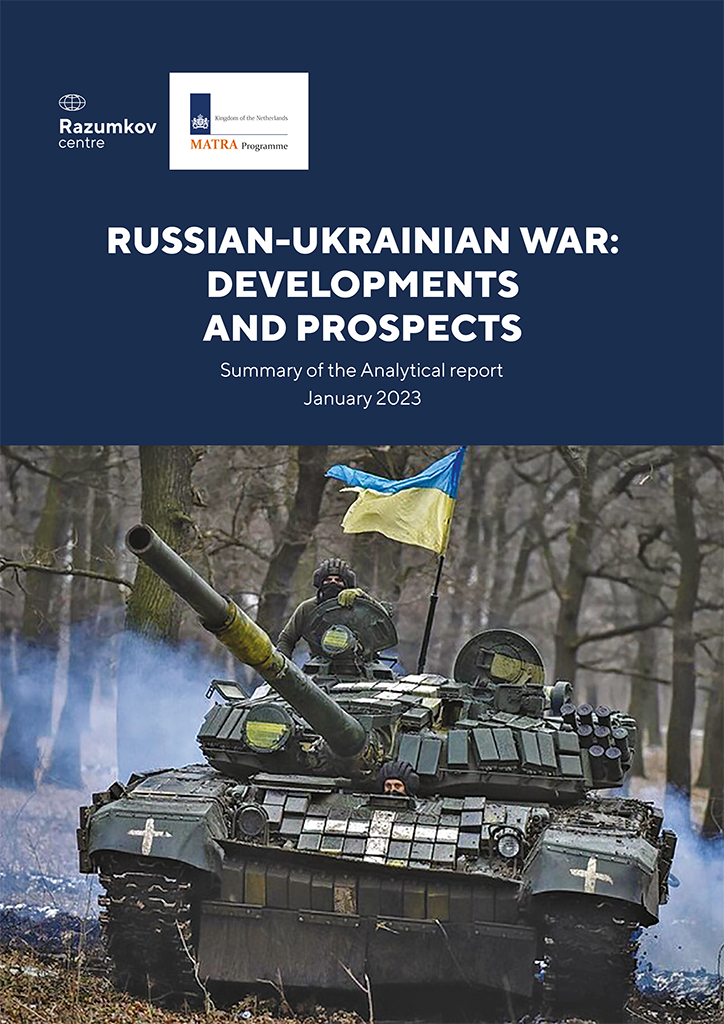
The analytical report covers the period from September 2022 to January 2023 and carries summarised assessments of the situation and conclusions from that period.
With its aggression upon Ukraine and ultimatum-like demands on NATO and the West in general, Russia has once again demonstrated its historic aggressiveness against the USA, Europe, and democracy as such. It views the export of corruption, selective granting of temporary preferences on its market, enhancement of the dependence of the European countries on Russian resources, strong anti-Western propaganda as mechanisms of weakening and splitting the Western unity.
UKRAINE: FROM COUNTERING AGGRESSION TO RECOVERY AND DEVELOPMENT
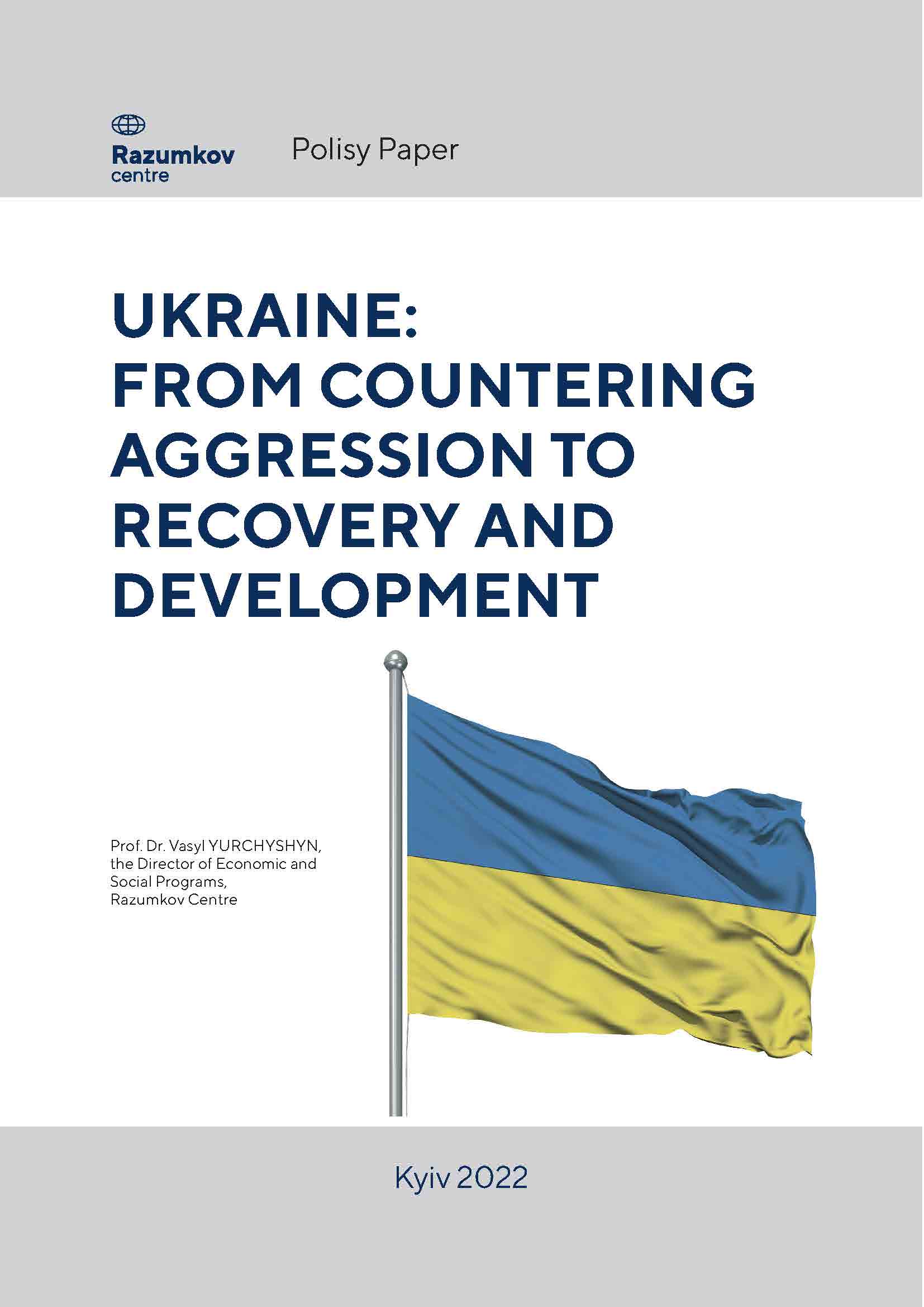
Prof. Dr. Vasyl YURCHYSHYN,the Director of Economic and Social Programs, Razumkov Centre
UKRAINIAN REFUGEES AT THE BORDER: the first experience of communication (March-May, 2022)
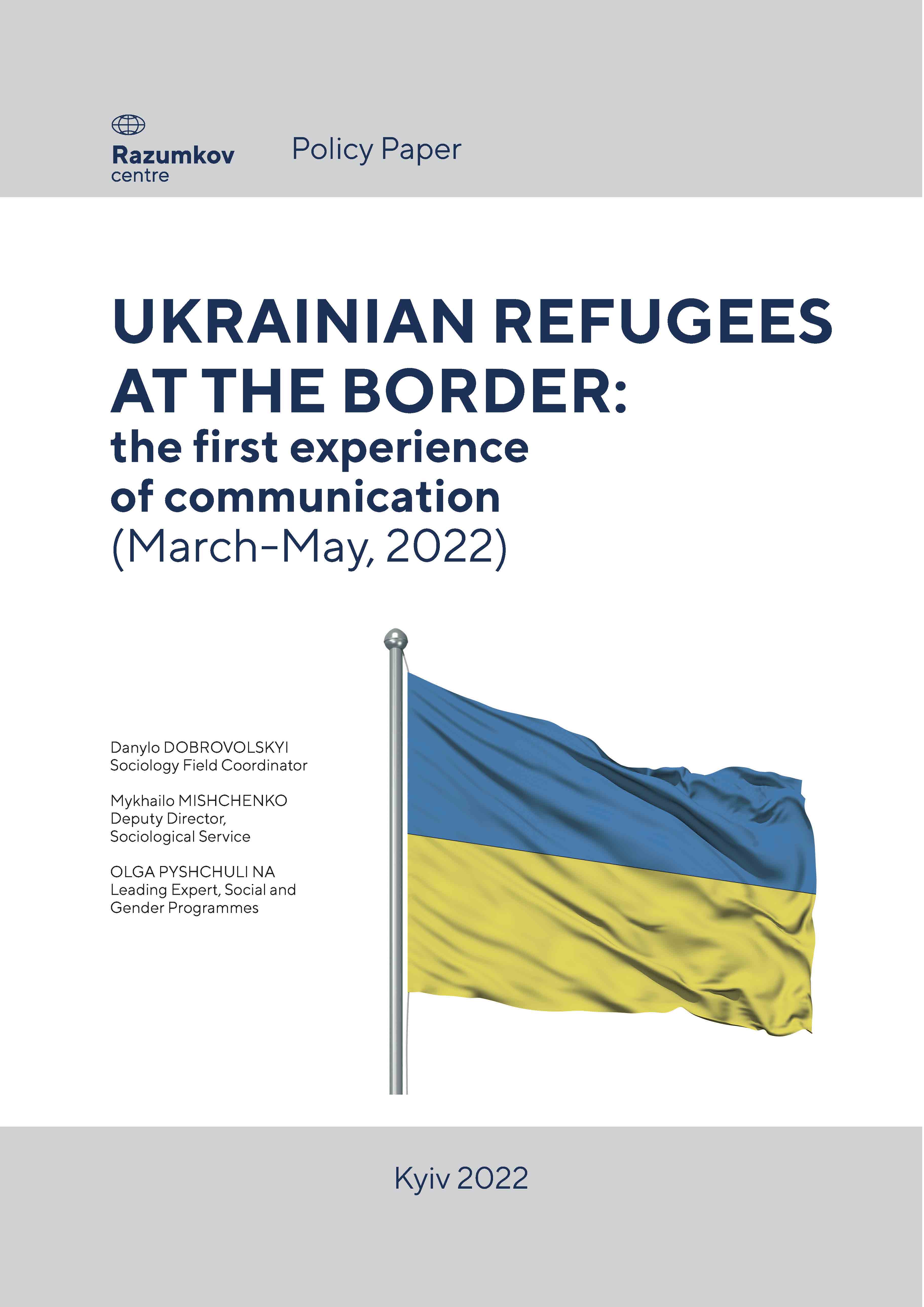
Danylo DOBROVOLSKYI - Sociology Field Coordinator
Mykhailo MISHCHENKO - Deputy Director, Sociological Service
OLGA PYSHCHULINA - Leading Expert, Social and Gender Programmes



